Overview
- Brief Narrative
- Trade advertisement for the American feature film “Confessions of a Nazi Spy” released by Warner Bros. Pictures in May 1939. Movie manufacturers send trade advertisements to exhibitors to increase the distribution of a film to as many theaters as possible. The film was chosen as Best Picture of the Year by the National Board of Review in 1939. Based on articles written in the New York Post by ex-agent Leon G. Turrou, the film recounts a fictionalized version of the Federal Bureau of Investigation’s (FBI) Rumrich Nazi Spy Case (1938). The film follows FBI agent Edward Renard’s investigation of Nazi spies affiliated with the German-American Bund as they work to steal American military secrets in the late 1930s. This was the first openly anti-Nazi film released by a prominent American movie studio. It took a firm stance on political matters, and deliberately warned the public about the dangers posed by a foreign power. The German Consul General in Los Angeles tried to halt production of the film, but failed. Fearing possible retribution for their relatives in Germany or German-controlled areas, many actors turned down roles in the film. While it was being shot, the studio received more than 100 threats, and had to hire security for the set. Upon release in the US, some citizens wanted it banned, while others picketed theaters and threatened exhibitors. In Poland, antisemitic audiences hanged exhibitors in their own theaters for showing the film. In 1939, it was banned in Germany, Italy, Japan, Holland, Norway, and Sweden. In 1940, “Confessions” was re-released with added newsreel footage of Nazi occupations in Europe, and was banned in an additional 18 nations where the Nazi regime could exert influence. This object is one of more than 1,200 objects in the Cinema Judaica Collection of materials related to films about World War II and the Holocaust as well as Jewish, Israeli, and biblical themes.
- Date
-
Cinematic Release:
1939
- Geography
-
creation:
United States
distribution: United States
- Credit Line
- United States Holocaust Memorial Museum Collection, Gift of Ken Sutak and Sherri Venokur
- Markings
- front cover, bottom center, printed, white ink : READY / for every showman who / calls himself an American!
inner leaves, across the top left and right, printed, red and white ink : It was Warners’ American Duty to Make it! / It is Your American Privilege to Show it!
Inner right leaf, lower right, printed, white ink : You’ll find these and 41 other / smash ads in the big press- / book … Get Yours Today!
back cover, top center, printed, red and white ink : Book It Now! / Then Stick Your American Chest Out and Show / Confessions of a / NAZI / SPY / The Star: / EDW. G. ROBINSON
back cover, lower left corner, printed, white ink : The Supporting Cast: / FRANCIS LEDERER / George Sanders · Paul / Lukas · Henry O’Neill / Directed by / ANATOLE LITVAK / Screen Play by Milton Krims & John Wexley / Based on materials gathered by Leon G. / Turrou, ace G-Man · A First Nat’l Picture
back cover, lower right corner, printed in red box, black ink : World Premiere! / WARNER BROS.’ N.Y. STRAND / Last Week in April! - Contributor
-
Compiler:
Ken Sutak
Production Company: Warner Bros. Pictures
- Biography
-
The Cinema Judaica Collection consists of more than 1,200 objects relating to films about World War II and the Holocaust as well as Jewish, Israeli, and biblical subjects, from 1923 to 2000, from the United States, Europe, Israel, Canada, Mexico, and Argentina. The collection was amassed by film memorabilia collector Ken Sutak, to document Holocaust-and Jewish-themed movies of the World War II era and the postwar years. The collection includes posters, lobby and photo cards, scene stills, pressbooks, trade ads, programs, magazines, books, VHS tapes, DVDS, and 78 rpm records.
Sutak organized these materials into two groups, “Cinema Judaica: The War Years, 1939–1949” and “Cinema Judaica: The Epic Cycle, 1950–1972” and, in conjunction with the Hebrew Union College-Jewish Institute of Religion Museum (now the Dr. Bernard Heller Museum in New York), organized exhibitions on these two themes in 2007 and 2008. Sutak subsequently authored companion books with the same titles.
Physical Details
- Language
- English
- Classification
-
Books and Published Materials
- Category
-
Brochures and ephemera
- Object Type
-
Trade literature (lcsh)
- Genre/Form
- Promotional materials.
- Physical Description
- Bifold promotional material printed on thick, shiny white paper with single-page advertisements on both the front and back, and a double-page advertisement spanning the center leaves when opened. All three are printed in white and black with some red highlights or text, mimicking the colors of the Nazi party. On the front image, there is white text across the bottom, and two arms reach down toward it from the upper edge of the page. The hand on the right extends from a striped sleeve with a 5-pointed star on the cuff. It firmly holds the wrist of the hand on the left, which extends from a sleeve bearing a red armband with a black swastika centered on a white circle. On the center advertisement, large, red text spans the top of both pages. Below, are three small, single-page advertisements arranged in a row, utilizing photographic images from the film. Additional white text is printed in the lower right corner, and there are two, double sets of staple holes along the white margin at the center of the open page. On the back, red and white text fills the black page, with some black text within a red rectangle on the lower right. There are small spots of white discoloration throughout.
Central advertisements featuring:
Edward G. Robinson as Edward Renard, Paul Lukas as Dr. Karl F. Kassell, Lya Lys as Erika Wolf, and Dorothy Tree as Hilda Kleinhauer - Dimensions
- Overall: Height: 12.500 inches (31.75 cm) | Width: 9.250 inches (23.495 cm)
- Materials
- overall : paper, ink
Rights & Restrictions
- Conditions on Access
- No restrictions on access
- Conditions on Use
- Restrictions on use. Copyright status is unknown.
Keywords & Subjects
- Topical Term
- Historical films. Motion pictures--History--20th century. Espionage. Espionage, German--United States. Spy films. Imprisonment in motion pictures. Patriotism in motion pictures. Motion picture industry--United States--History--20th century. Nazis--United States--Drama. Spies--Drama. World War (1939-1945) Executive departments
- Geographic Name
- United States. Germany.
- Personal Name
- Turrou, Leon G. Robinson, Edward G., 1893-1973. Sanders, George, 1906-1972. Lederer, Francis, 1899-2000. Lukas, Paul, 1894-1971. Lys, Lya, 1908-1986. Tree, Dorothy, 1906-1992.
- Corporate Name
- Warner Bros. Pictures (1923-1967) German American Bund
Administrative Notes
- Legal Status
- Permanent Collection
- Provenance
- The trade advertisement was donated to the United States Holocaust Memorial Museum in 2018 by Ken Sutak and Sherri Venokur.
- Record last modified:
- 2023-08-25 08:08:09
- This page:
- https://collections.ushmm.org/search/catalog/irn693008
Download & Licensing
In-Person Research
- By Appointment
- Request 21 Days in Advance of Visit
- Plan a Research Visit
- Request to See This Object
Contact Us
Also in Cinema Judaica collection
The Cinema Judaica Collection consists of posters, lobby and photo cards, scene stills, pressbooks, trade ads, programs, magazines, books, VHS tapes, DVDS, and 78 rpm records relating to films about World War II and the Holocaust as well as Jewish, Israeli, and biblical subjects, from 1923 to 2000, from the United States, Europe, Israel, Canada, Mexico, and Argentina.
Date: 1923-2000
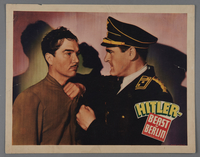
Lobby card for the film “Hitler, Beast of Berlin" (1939)
Object
Lobby card for the American feature film “Hitler, Beast of Berlin” released by Producers Pictures Corporation in October 1939, and re-released in 1942. Lobby cards are promotional materials placed in theater lobby windows to highlight specific movie scenes, rather than the broader themes often depicted on posters. After encountering opposition from censorship boards, the film was alternatively called “Goose Step,” the title of the adapted novel, and eventually released as “Beasts of Berlin.” In the film, Hans Memling, his wife, and his brother-in-law are members of an underground Nazi-resistance movement. He is arrested and ends up in a camp as a political prisoner. Hans and the other prisoners are interrogated, beaten, and forced into slave labor at the hands of Nazi guards. This was the first American film to depict a simulated concentration camp in Germany. The film also includes newsreel footage of military marches and of Adolf Hitler himself. While it acknowledged a pervasive isolationist mentality, “Beasts” also appealed to the American values of democracy and freedom. Press materials encouraged a sensationalist marketing strategy while official statements claimed that the film was not propaganda. Prior to its release, “Beasts of Berlin” received numerous sanctions from the censors at the Production Code Administration (PCA). This object is one of more than 1,200 objects in the Cinema Judaica Collection of materials related to films about World War II and the Holocaust as well as Jewish, Israeli, and biblical themes.
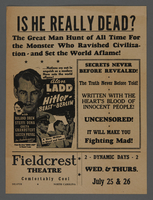
U.S. re-release advertisement for the film “Hitler, Beast of Berlin" (1939)
Object
Re-release advertisement for the American feature film “Hitler, Beast of Berlin,” originally released by Producers Pictures Corporation in October 1939, and re-released in 1942. After encountering opposition from censorship boards, the film was alternatively called “Goose Step,” the title of the adapted novel, and eventually released as “Beasts of Berlin.” In the film, Hans Memling, his wife, and his brother-in-law are members of an underground Nazi-resistance movement. He is arrested and ends up in a camp as a political prisoner. Hans and the other prisoners are interrogated, beaten, and forced into slave labor at the hands of Nazi guards. This was the first American film to depict a simulated concentration camp in Germany. The film also includes newsreel footage of military marches and of Adolf Hitler himself. While it acknowledged a pervasive isolationist mentality, “Beasts” also appealed to the American values of democracy and freedom. Press materials encouraged a sensationalist marketing strategy while official statements claimed that the film was not propaganda. Prior to its release, “Beasts of Berlin” received numerous sanctions from the censors at the Production Code Administration (PCA). This object is one of more than 1,200 objects in the Cinema Judaica Collection of materials related to films about World War II and the Holocaust as well as Jewish, Israeli, and biblical themes.
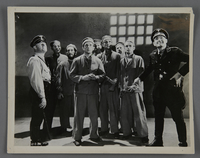
Scene still from the film “Hitler, Beast of Berlin" (1939)
Object
Scene still from the American feature film “Hitler, Beast of Berlin,” originally released by Producers Pictures Corporation in October 1939, and re-released in 1942. Scene stills are photographs taken on or off the set of a motion picture and are then used as marketing and advertising tools. After encountering opposition from censorship boards, the film was alternatively called “Goose Step,” the title of the adapted novel, and eventually released as “Beasts of Berlin.” In the film, Hans Memling, his wife, and his brother-in-law are members of an underground Nazi-resistance movement. He is arrested and ends up in a camp as a political prisoner. Hans and the other prisoners are interrogated, beaten, and forced into slave labor at the hands of Nazi guards. This was the first American film to depict a simulated concentration camp in Germany. The film also includes newsreel footage of military marches and of Adolf Hitler himself. While it acknowledged a pervasive isolationist mentality, “Beasts” also appealed to the American values of democracy and freedom. Press materials encouraged a sensationalist marketing strategy while official statements claimed that the film was not propaganda. Prior to its release, “Beasts of Berlin” received numerous sanctions from the censors at the Production Code Administration (PCA). This object is one of more than 1,200 objects in the Cinema Judaica Collection of materials related to films about World War II and the Holocaust as well as Jewish, Israeli, and biblical themes.
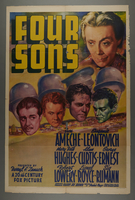
Poster for the film “Four Sons" (1940)
Object
Poster for the American feature film “Four Sons,” released by 20th Century-Fox in June 1940. The film was a remake of a 1928 film by the same name, set in Bavaria before and during World War I. The 1940 remake was set during the late 1930s in the Czechoslovakian region along the German border known as the Sudetenland. It focuses on a mother and her four sons, who have divided political loyalties. One son enlists in the Czech army and clashes with his brother who joins the Nazis. A third brother is drafted by the German army after the Sudetenland was annexed in 1938, while the fourth brother, an artist, escapes the same fate by immigrating to the United States. Three of the four brothers are killed as a result of the war, and the mother, her daughter-in-law, and grandson set out to immigrate to the United States. Advertising for “Four Sons” was the first to use imagery of the “specter of death,” a common theme of interventionist political cartoons and editorials. This led to threats on the studio from the German consul-general. This object is one of more than 1,200 objects in the Cinema Judaica Collection of materials related to films about World War II and the Holocaust as well as Jewish, Israeli, and biblical themes.
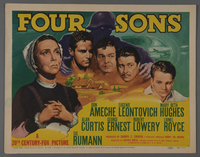
Set of seven lobby cards for the film “Four Sons" (1940)
Object
Set of lobby cards for the American feature film “Four Sons,” released by 20th Century-Fox in June 1940. Lobby cards are promotional materials placed in theater lobby windows to highlight specific movie scenes, rather than the broader themes often depicted on posters. The film was a remake of a 1928 film by the same name, set in Bavaria before and during World War I. The 1940 remake was set during the late 1930s in the Czechoslovakian region along the German border known as the Sudetenland. It focuses on a mother and her four sons, who have divided political loyalties. One son enlists in the Czech army and clashes with his brother who joins the Nazis. A third brother is drafted by the German army after the Sudetenland was annexed in 1938, while the fourth brother, an artist, escapes the same fate by immigrating to the United States. Three of the four brothers are killed as a result of the war, and the mother, her daughter-in-law, and grandson set out to immigrate to the United States. Advertising for “Four Sons” was the first to use imagery of the “specter of death,” a common theme of interventionist political cartoons and editorials. This led to threats on the studio from the German consul-general. This object is one of more than 1,200 objects in the Cinema Judaica Collection of materials related to films about World War II and the Holocaust as well as Jewish, Israeli, and biblical themes.
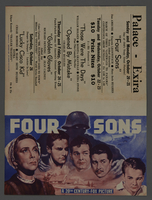
United States advertisement for the film “Four Sons" (1940)
Object
Advertisement for the American feature film “Four Sons,” released by 20th Century-Fox in June 1940. The film was a remake of a 1928 film by the same name, set in Bavaria before and during World War I. The 1940 remake was set during the late 1930s in the Czechoslovakian region along the German border known as the Sudetenland. It focuses on a mother and her four sons, who have divided political loyalties. One son enlists in the Czech army and clashes with his brother who joins the Nazis. A third brother is drafted by the German army after the Sudetenland was annexed in 1938, while the fourth brother, an artist, escapes the same fate by immigrating to the United States. Three of the four brothers are killed as a result of the war, and the mother, her daughter-in-law, and grandson set out to immigrate to the United States. Advertising for “Four Sons” was the first to use imagery of the “specter of death,” a common theme of interventionist political cartoons and editorials. This led to threats on the studio from the German consul-general. This object is one of more than 1,200 objects in the Cinema Judaica Collection of materials related to films about World War II and the Holocaust as well as Jewish, Israeli, and biblical themes.
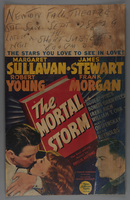
U.S. Window Card for the film “The Mortal Storm" (1940)
Object
Window card for the American feature film, “The Mortal Storm,” released by Metro-Goldwyn-Mayer (MGM) in June 1940. Window cards were mass-produced promotional materials used until the mid-1980s. They included a blank section at the top for individual theaters to write in dates and show times, and placed in locations outside of the theaters. “The Mortal Storm,” based on a 1938 novel of the same name, was MGM’s first film that openly criticized Nazi Germany. Beginning in 1933, just after Hitler’s appointment as chancellor, it features a Jewish professor of medicine and his daughter, whose fiancé and stepbrothers join the Nazi party. The professor is sent to a concentration camp, while his daughter attempts to cross the Austrian border with a former student of her father’s. The writers of the screenplay were themselves refugees from Nazi Germany. After the movie’s release, German propaganda minister, Joseph Goebbels ordered the Berlin office of MGM’s parent company, Lowe’s, to close. He also banned the film (as well as subsequent MGM films) in all German-occupied territories. This object is one of more than 1,200 objects in the Cinema Judaica Collection of materials related to films about World War II and the Holocaust as well as Jewish, Israeli, and biblical themes.
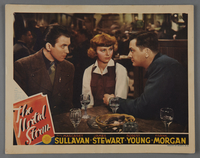
U.S. lobby card for the film “The Mortal Storm" (1940)
Object
Lobby card for the American feature film, “The Mortal Storm,” released by Metro-Goldwyn-Mayer (MGM) in June 1940. Lobby cards were promotional materials placed in theater lobby windows to highlight specific movie scenes, rather than the broader themes often depicted on posters. “The Mortal Storm,” based on a 1938 novel of the same name, was MGM’s first film that openly criticized Nazi Germany. Beginning in 1933, just after Hitler’s appointment as chancellor, it features a Jewish professor of medicine and his daughter, whose fiancé and stepbrothers join the Nazi party. The professor is sent to a concentration camp, while his daughter attempts to cross the Austrian border with a former student of her father’s. The writers of the screenplay were themselves refugees from Nazi Germany. After the movie’s release, German propaganda minister, Joseph Goebbels ordered the Berlin office of MGM’s parent company, Lowe’s, to close. He also banned the film (as well as subsequent MGM films) in all German-occupied territories. This object is one of more than 1,200 objects in the Cinema Judaica Collection of materials related to films about World War II and the Holocaust as well as Jewish, Israeli, and biblical themes.
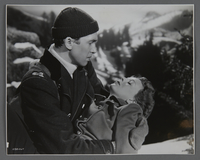
U.S. scene stills for the film “The Mortal Storm" (1940)
Object
Pair of scene stills for the American feature film, “The Mortal Storm,” released by Metro-Goldwyn-Mayer (MGM) in June 1940. Scene stills are photographs taken on or off the set of a motion picture and are then used as marketing and advertising tools. “The Mortal Storm,” based on a 1938 novel of the same name, was MGM’s first film that openly criticized Nazi Germany. Beginning in 1933, just after Hitler’s appointment as chancellor, it features a Jewish professor of medicine and his daughter, whose fiancé and stepbrothers join the Nazi party. The professor is sent to a concentration camp, while his daughter attempts to cross the Austrian border with a former student of her father’s. The writers of the screenplay were themselves refugees from Nazi Germany. After the movie’s release, German propaganda minister, Joseph Goebbels ordered the Berlin office of MGM’s parent company, Lowe’s, to close. He also banned the film (as well as subsequent MGM films) in all German-occupied territories. This object is one of more than 1,200 objects in the Cinema Judaica Collection of materials related to films about World War II and the Holocaust as well as Jewish, Israeli, and biblical themes.
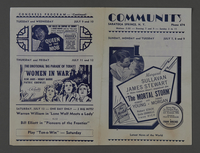
Women in War, Theater Weekly Handbill
Object
This object is one of more than 1,200 objects in the Cinema Judaica Collection of materials related to films about World War II and the Holocaust as well as Jewish, Israeli, and biblical themes.
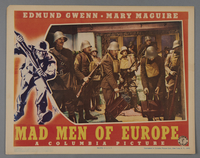
Lobby card for the film “Mad Men of Europe" (1940)
Object
Lobby card for the feature film, “Mad Men of Europe,” originally released as “An Englishman's Home” in Great Britain. It was released in the United States on June 26, 1940, and distributed by Columbia Pictures. Lobby cards were promotional materials placed in theater lobby windows to highlight specific movie scenes, rather than the broader themes often depicted on posters. Based on a 1909 English play, and first made into a silent film in 1914, the movie depicts the German invasion of England, months before the actual assault on Western Europe began in May. Although Germany never occupied Britain, the film seemed prophetic. Britain’s neighbor and ally, France, was invaded by Germany and was forced to sign an armistice agreement with on June 22, just days before the film’s release in the United States. This object is one of more than 1,200 objects in the Cinema Judaica Collection of materials related to films about World War II and the Holocaust as well as Jewish, Israeli, and biblical themes.
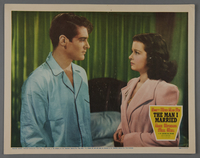
Set of four lobby cards for the film “The Man I Married" (1940)
Object
Set of four lobby cards for the American feature film “The Man I Married,” released by 20th Century-Fox in August 1940. Lobby cards are promotional materials placed in theater lobby windows to highlight specific movie scenes, rather than the broader themes often depicted on posters. “The Man I Married” was based on the novel “I Married A Nazi,” published serially in “Liberty” magazine. The film focuses on an American woman who moves with her German husband and their child back to his home country in 1938. Once in Germany, the husband gets increasingly involved in the Nazi party. “The Man I Married” included a Jewish leading character, and used dialog to allude to the predicament of Jews in Nazi Germany. The film was originally given the same title as the novel, but after the anti-Nazi films “Four Sons” and “The Mortal Storm” drew criticism and economic threats from the German consul-general, the studio decided to mask the anti-Nazi film under a different name. Officials in Canada had no such concerns, as the country had entered the war in September 1939, and the film was released there under the original name. This object is one of more than 1,200 objects in the Cinema Judaica Collection of materials related to films about World War II and the Holocaust as well as Jewish, Israeli, and biblical themes.

Canadian newspaper advertisement for the film “The Man I Married" (1940)
Object
Canadian advertisement for the American feature film “I Married a Nazi,” released by 20th Century-Fox in August 1940. “The Man I Married” was based on the novel “I Married A Nazi,” published serially in “Liberty” magazine. The film focuses on an American woman who moves with her German husband and their child back to his home country in 1938. Once in Germany, the husband gets increasingly involved in the Nazi party. “The Man I Married” included a Jewish leading character, and used dialog to allude to the predicament of Jews in Nazi Germany. The film was originally given the same title as the novel, but after the anti-Nazi films “Four Sons” and “The Mortal Storm” drew criticism and economic threats from the German consul-general, the studio decided to mask the anti-Nazi film under a different name. Officials in Canada had no such concerns, as the country had entered the war in September 1939, and the film was released there under the original name. This object is one of more than 1,200 objects in the Cinema Judaica Collection of materials related to films about World War II and the Holocaust as well as Jewish, Israeli, and biblical themes.
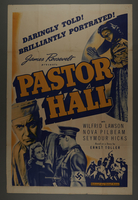
U.S. one-sheet poster for the movie “Pastor Hall” (1940)
Object
One-sheet poster for the British feature film “Pastor Hall,” released in the United States on September 13, 1940. “Pastor Hall” was an adaptation of the 1938 play written by Ernst Toller, a Prussian Jewish veteran of World War I. After Hitler was appointed Chancellor of Germany in 1933, Toller was declared an enemy of the state and immigrated to England, and moved again to the United States in 1936. In the film, a Lutheran minister resists the Nazification of German Protestant churches, and is imprisoned in a concentration camp as a result. He manages to escape, but is eventually killed. It equates Hitler with the Antichrist, bent on destroying not only the Jewish people, but Christianity as well. The protagonist is based on Rev. Martin Niemöller, who was arrested in 1936 and sent to Dachau concentration camp. ”Pastor Hall” was brought to the United States by James Roosevelt, son of First Lady Eleanor and President Franklin Delano Roosevelt. The producers had to cut 5 minutes of the most brutal scenes before it was given approval by the American censors. The First Lady recorded a prologue to the film, informing the American viewers that it was representative of actual events. This object is one of more than 1,200 objects in the Cinema Judaica Collection of materials related to films about World War II and the Holocaust as well as Jewish, Israeli, and biblical themes.
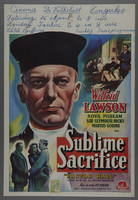
Belgian window card for the movie “Pastor Hall” (1940)
Object
Belgian window card for the British feature film “Pastor Hall,” released in the United States on September 13, 1940. Window cards were mass-produced promotional materials used until the mid-1980s. They included a blank section at the top for individual theaters to write in dates and show times, and placed in locations outside of the theaters. “Pastor Hall” was an adaptation of the 1938 play written by Ernst Toller, a Prussian Jewish veteran of World War I. After Hitler was appointed Chancellor of Germany in 1933, Toller was declared an enemy of the state and immigrated to England, and moved again to the United States in 1936. In the film, a Lutheran minister resists the Nazification of German Protestant churches, and is imprisoned in a concentration camp as a result. He manages to escape, but is eventually killed. It equates Hitler with the Antichrist, bent on destroying not only the Jewish people, but Christianity as well. The protagonist is based on Rev. Martin Niemöller, who was arrested in 1936 and sent to Dachau concentration camp. ”Pastor Hall” was brought to the United States by James Roosevelt, son of First Lady Eleanor and President Franklin Delano Roosevelt. The producers had to cut 5 minutes of the most brutal scenes before it was given approval by the American censors. The First Lady recorded a prologue to the film, informing the American viewers that it was representative of actual events. This object is one of more than 1,200 objects in the Cinema Judaica Collection of materials related to films about World War II and the Holocaust as well as Jewish, Israeli, and biblical themes.
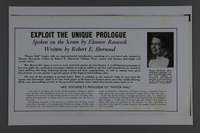
Enlarged reproduction of a pressbook page for the movie “Pastor Hall” (1940)
Object
Enlarged reproduction of a pressbook page for the British feature film “Pastor Hall,” released in the United States on September 13, 1940. This reproduction was created for the 2007 “Cinema Judaica” exhibition at the Hebrew Union College-Jewish Institute of Religion (HUC-JIR) Dr. Bernard Heller Museum in New York City. It provides a transcription of the introduction that First Lady Eleanor Roosevelt recorded for the movie’s American release. “Pastor Hall” was an adaptation of the 1938 play written by Ernst Toller, a Prussian Jewish veteran of World War I. After Hitler was appointed Chancellor of Germany in 1933, Toller was declared an enemy of the state and immigrated to England, and moved again to the United States in 1936. In the film, a Lutheran minister resists the Nazification of German Protestant churches, and is imprisoned in a concentration camp as a result. He manages to escape, but is eventually killed. It equates Hitler with the Antichrist, bent on destroying not only the Jewish people, but Christianity as well. The protagonist is based on Rev. Martin Niemöller, who was arrested in 1936 and sent to Dachau concentration camp. ”Pastor Hall” was brought to the United States by James Roosevelt, son of First Lady Eleanor and President Franklin Delano Roosevelt. The producers had to cut 5 minutes of the most brutal scenes before it was given approval by the American censors. The First Lady recorded a prologue to the film, informing the American viewers that it was representative of actual events. This object is one of more than 1,200 objects in the Cinema Judaica Collection of materials related to films about World War II and the Holocaust as well as Jewish, Israeli, and biblical themes.
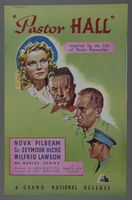
British trade advertisement for the movie “Pastor Hall” (1940)
Object
Double-sided British trade advertisement, promoting “Pastor Hall” on one side and “Under Your Hat” on the reverse. “Pastor Hall” (1940) was a British feature film, released in the United States on September 13, 1940. “Pastor Hall” was an adaptation of the 1938 play written by Ernst Toller, a Prussian Jewish veteran of World War I. After Hitler was appointed Chancellor of Germany in 1933, Toller was declared an enemy of the state and immigrated to England, and moved again to the United States in 1936. In the film, a Lutheran minister resists the Nazification of German Protestant churches, and is imprisoned in a concentration camp as a result. He manages to escape, but is eventually killed. It equates Hitler with the Antichrist, bent on destroying not only the Jewish people, but Christianity as well. The protagonist is based on Rev. Martin Niemöller, who was arrested in 1936 and sent to Dachau concentration camp. ”Pastor Hall” was brought to the United States by James Roosevelt, son of First Lady Eleanor and President Franklin Delano Roosevelt. The producers had to cut 5 minutes of the most brutal scenes before it was given approval by the American censors. The First Lady recorded a prologue to the film, informing the American viewers that it was representative of actual events. This object is one of more than 1,200 objects in the Cinema Judaica Collection of materials related to films about World War II and the Holocaust as well as Jewish, Israeli, and biblical themes.
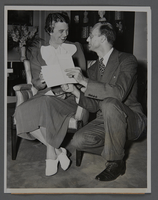
Publicity photographs of Eleanor Roosevelt for the movie “Pastor Hall” (1940)
Object
Set of two publicity photographs featuring First Lady Eleanor Roosevelt, for the British feature film “Pastor Hall,” released in the United States on September 13, 1940. “Pastor Hall” was an adaptation of the 1938 play written by Ernst Toller, a Prussian Jewish veteran of World War I. After Hitler was appointed Chancellor of Germany in 1933, Toller was declared an enemy of the state and immigrated to England, and moved again to the United States in 1936. In the film, a Lutheran minister resists the Nazification of German Protestant churches, and is imprisoned in a concentration camp as a result. He manages to escape, but is eventually killed. It equates Hitler with the Antichrist, bent on destroying not only the Jewish people, but Christianity as well. The protagonist is based on Rev. Martin Niemöller, who was arrested in 1936 and sent to Dachau concentration camp. ”Pastor Hall” was brought to the United States by James Roosevelt, son of First Lady Eleanor and President Franklin Delano Roosevelt. The producers had to cut 5 minutes of the most brutal scenes before it was given approval by the American censors. The First Lady recorded a prologue to the film, informing the American viewers that it was representative of actual events. This object is one of more than 1,200 objects in the Cinema Judaica Collection of materials related to films about World War II and the Holocaust as well as Jewish, Israeli, and biblical themes.
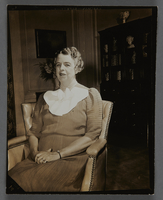
Photographic print of Eleanor Roosevelt promoting the movie “Pastor Hall” (1940)
Object
Photographic print featuring First Lady Eleanor Roosevelt, for the British feature film “Pastor Hall,” released in the United States on September 13, 1940. “Pastor Hall” was an adaptation of the 1938 play written by Ernst Toller, a Prussian Jewish veteran of World War I. After Hitler was appointed Chancellor of Germany in 1933, Toller was declared an enemy of the state and immigrated to England, and moved again to the United States in 1936. In the film, a Lutheran minister resists the Nazification of German Protestant churches, and is imprisoned in a concentration camp as a result. He manages to escape, but is eventually killed. It equates Hitler with the Antichrist, bent on destroying not only the Jewish people, but Christianity as well. The protagonist is based on Rev. Martin Niemöller, who was arrested in 1936 and sent to Dachau concentration camp. ”Pastor Hall” was brought to the United States by James Roosevelt, son of First Lady Eleanor and President Franklin Delano Roosevelt. The producers had to cut 5 minutes of the most brutal scenes before it was given approval by the American censors. The First Lady recorded a prologue to the film, informing the American viewers that it was representative of actual events. This object is one of more than 1,200 objects in the Cinema Judaica Collection of materials related to films about World War II and the Holocaust as well as Jewish, Israeli, and biblical themes.
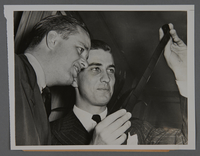
Publicity photographs for the movie “Pastor Hall” (1940)
Object
Set of two publicity photographs for the British feature film “Pastor Hall,” released in the United States on September 13, 1940. The photographs feature the sons of First Lady Eleanor and President Franklin Delano Roosevelt, Elliott, Franklin, Jr., and James Roosevelt at the Philadelphia and New York premieres of the film. “Pastor Hall” was an adaptation of the 1938 play written by Ernst Toller, a Prussian Jewish veteran of World War I. After Hitler was appointed Chancellor of Germany in 1933, Toller was declared an enemy of the state and immigrated to England, and moved again to the United States in 1936. In the film, a Lutheran minister resists the Nazification of German Protestant churches, and is imprisoned in a concentration camp as a result. He manages to escape, but is eventually killed. It equates Hitler with the Antichrist, bent on destroying not only the Jewish people, but Christianity as well. The protagonist is based on Rev. Martin Niemöller, who was arrested in 1936 and sent to Dachau concentration camp. ”Pastor Hall” was brought to the United States by James Roosevelt, son of First Lady Eleanor and President Franklin Delano Roosevelt. The producers had to cut 5 minutes of the most brutal scenes before it was given approval by the American censors. The First Lady recorded a prologue to the film, informing the American viewers that it was representative of actual events. This object is one of more than 1,200 objects in the Cinema Judaica Collection of materials related to films about World War II and the Holocaust as well as Jewish, Israeli, and biblical themes.
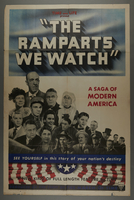
U.S. One-Sheet Poster for the film “The Ramparts We Watch” (1940)
Object
One-sheet poster for the American feature film “The Ramparts We Watch,” released in the United States on August 16, 1940, and re-released in September with a revised ending. “The Ramparts We Watch” was the first feature-length film produced by March of Time, a subsidiary of Time, Inc., who was primarily known for newsreels. As a result, the film blends newsreel and archival footage with dramatized scenes. Filmed in New London, Connecticut, producers recruited local residents for the cast. The film begins in 1914, when Americans are learning about the escalation of war in Europe. It centers on the residents of an unnamed small town, which includes Austrian and German immigrants who are directly affected and treated with suspicion. As the war progresses, residents of the town and nation begin debating whether the United States should remain neutral. After the U.S. enters the war in 1917, many of the men in the town volunteer or are drafted. The film’s final section is an appeal to the audience, explicitly arguing that in the present day, the country is facing a similar threat from Adolf Hitler and Nazi Germany, and advocates for intervention. “The Ramparts We Watch” incorporated footage from the German propaganda film “Baptism of Fire,” and the filmmakers were accused of piracy by a German distribution company and threatened with reprisals by the German government. The film was also banned in several U.S. states because of the footage. This object is one of more than 1,200 objects in the Cinema Judaica Collection of materials related to films about World War II and the Holocaust as well as Jewish, Israeli, and biblical themes.
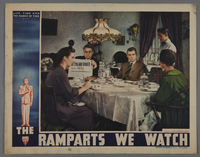
Set of eight lobby cards for the film “The Ramparts We Watch” (1940)
Object
Lobby card for the American feature film “The Ramparts We Watch,” released in the United States on August 16, 1940, and re-released in September with a revised ending. Lobby cards are promotional materials placed in theater lobby windows to highlight specific movie scenes, rather than the broader themes often depicted on posters. “The Ramparts We Watch” was the first feature-length film produced by March of Time, a subsidiary of Time, Inc., who was primarily known for newsreels. As a result, the film blends newsreel and archival footage with dramatized scenes. Filmed in New London, Connecticut, producers recruited local residents for the cast. The film begins in 1914, when Americans are learning about the escalation of war in Europe. It centers on the residents of an unnamed small town, which includes Austrian and German immigrants who are directly affected and treated with suspicion. As the war progresses, residents of the town and nation begin debating whether the United States should remain neutral. After the U.S. enters the war in 1917, many of the men in the town volunteer or are drafted. The film’s final section is an appeal to the audience, explicitly arguing that in the present day, the country is facing a similar threat from Adolf Hitler and Nazi Germany, and advocates for intervention. “The Ramparts We Watch” incorporated footage from the German propaganda film “Baptism of Fire,” and the filmmakers were accused of piracy by a German distribution company and threatened with reprisals by the German government. The film was also banned in several U.S. states because of the footage. This object is one of more than 1,200 objects in the Cinema Judaica Collection of materials related to films about World War II and the Holocaust as well as Jewish, Israeli, and biblical themes.
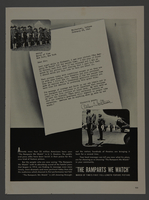
U.S. magazine advertisement for the film “The Ramparts We Watch” (1940)
Object
Magazine advertisement for the American feature film “The Ramparts We Watch,” released in the United States on August 16, 1940, and re-released in September with a revised ending. “The Ramparts We Watch” was the first feature-length film produced by March of Time, a subsidiary of Time, Inc., who was primarily known for newsreels. As a result, the film blends newsreel and archival footage with dramatized scenes. Filmed in New London, Connecticut, producers recruited local residents for the cast. The film begins in 1914, when Americans are learning about the escalation of war in Europe. It centers on the residents of an unnamed small town, which includes Austrian and German immigrants who are directly affected and treated with suspicion. As the war progresses, residents of the town and nation begin debating whether the United States should remain neutral. After the U.S. enters the war in 1917, many of the men in the town volunteer or are drafted. The film’s final section is an appeal to the audience, explicitly arguing that in the present day, the country is facing a similar threat from Adolf Hitler and Nazi Germany, and advocates for intervention. “The Ramparts We Watch” incorporated footage from the German propaganda film “Baptism of Fire,” and the filmmakers were accused of piracy by a German distribution company and threatened with reprisals by the German government. The film was also banned in several U.S. states because of the footage. This object is one of more than 1,200 objects in the Cinema Judaica Collection of materials related to films about World War II and the Holocaust as well as Jewish, Israeli, and biblical themes.
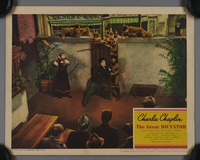
Lobby card for the film “The Great Dictator" (1940)
Object
Lobby card for the American satirical film, “The Great Dictator,” released by United Artists in the United States in October 1940. Lobby cards are promotional materials placed in theater lobby windows to highlight specific movie scenes, rather than the broader themes often depicted on posters. In his first film with dialog, Charlie Chaplin plays both an unnamed Jewish barber with amnesia and a fictional dictator that is a thinly veiled caricature of Hitler. The two characters are caught up in a comic case of mistaken identity before taking a serious turn at the end. The barber gives a three-minute-long speech promoting human kindness against evil, a monologue that has Chaplin effectively breaking the fourth wall, directly addressing the audience by speaking directly at the camera. “The Great Dictator,” earned five Academy Award nominations, but also led to a Senate subcommittee to subpoena Chaplin to testify in relation to war propaganda in films. The success of the satire occurred before the American public was aware of the atrocities occurring under Hitler’s orders. Conversely, the comic portrayal of the dictator led the film to be banned in Spain, Italy, and Ireland. The film also includes the first onscreen depiction of Jewish freedom fighters during a raid of the Jewish ghetto. This object is one of more than 1,200 objects in the Cinema Judaica Collection of materials related to films about World War II and the Holocaust as well as Jewish, Israeli, and biblical themes.
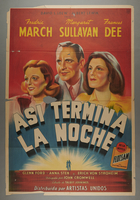
Argentine One-Sheet Poster for the film “So Ends Our Night” (1941)
Object
Argentinian poster for the American feature film, “So Ends Our Night,” released in the United States in February 1941, and re-released in 1948. “So Ends Our Night” was an independently produced adaptation of the 1939 novel, “Flotsam,” by Erich Maria Remarque. Remarque was a German veteran of World War I, who became famous for writing “All Quiet on the Western Front” about war and the experiences of German soldiers. After Hitler was appointed Chancellor of Germany in 1933, Remarque’s works were deemed “unpatriotic” and banned. He fled for Switzerland, had his German citizenship revoked in 1938, and immigrated to the United States just before the start of World War II. “So Ends Our Night” begins in 1937 and focuses on three German refugees, whose paths cross on multiple occasions as they move throughout Western Europe to flee Nazi persecution. It highlights the predicament of (largely Jewish) refugees who are unable to obtain the legal documentation needed to enter or settle in free countries. It was one of the first Hollywood film to focus on the experiences of refugees. Despite a revised marketing campaign, the film was widely viewed as too solemn, slow, and lacking in drama. This object is one of more than 1,200 objects in the Cinema Judaica Collection of materials related to films about World War II and the Holocaust as well as Jewish, Israeli, and biblical themes.
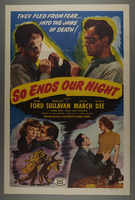
U.S. One-Sheet Poster for the re-release of “So Ends Our Night” (1941)
Object
One-sheet, re-release poster for the American feature film, “So Ends Our Night,” released in the United States in February 1941, and re-released in 1948. “So Ends Our Night” was an independently produced adaptation of the 1939 novel, “Flotsam,” by Erich Maria Remarque. Remarque was a German veteran of World War I, who became famous for writing “All Quiet on the Western Front” about war and the experiences of German soldiers. After Hitler was appointed Chancellor of Germany in 1933, Remarque’s works were deemed “unpatriotic” and banned. He fled for Switzerland, had his German citizenship revoked in 1938, and immigrated to the United States just before the start of World War II. “So Ends Our Night” begins in 1937 and focuses on three German refugees, whose paths cross on multiple occasions as they move throughout Western Europe to flee Nazi persecution. It highlights the predicament of (largely Jewish) refugees who are unable to obtain the legal documentation needed to enter or settle in free countries. It was one of the first Hollywood film to focus on the experiences of refugees. Despite a revised marketing campaign, the film was widely viewed as too solemn, slow, and lacking in drama. This object is one of more than 1,200 objects in the Cinema Judaica Collection of materials related to films about World War II and the Holocaust as well as Jewish, Israeli, and biblical themes.
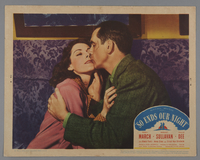
Lobby card for the film “So Ends Our Night” (1941)
Object
Lobby card for the American feature film, “So Ends Our Night,” released in the United States in February 1941, and re-released in 1948. Lobby cards are promotional materials placed in theater lobby windows to highlight specific movie scenes, rather than the broader themes often depicted on posters. “So Ends Our Night” was an independently produced adaptation of the 1939 novel, “Flotsam,” by Erich Maria Remarque. Remarque was a German veteran of World War I, who became famous for writing “All Quiet on the Western Front” about war and the experiences of German soldiers. After Hitler was appointed Chancellor of Germany in 1933, Remarque’s works were deemed “unpatriotic” and banned. He fled for Switzerland, had his German citizenship revoked in 1938, and immigrated to the United States just before the start of World War II. “So Ends Our Night” begins in 1937 and focuses on three German refugees, whose paths cross on multiple occasions as they move throughout Western Europe to flee Nazi persecution. It highlights the predicament of (largely Jewish) refugees who are unable to obtain the legal documentation needed to enter or settle in free countries. It was one of the first Hollywood film to focus on the experiences of refugees. Despite a revised marketing campaign, the film was widely viewed as too solemn, slow, and lacking in drama. This object is one of more than 1,200 objects in the Cinema Judaica Collection of materials related to films about World War II and the Holocaust as well as Jewish, Israeli, and biblical themes.
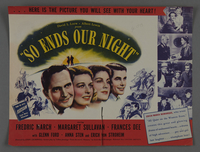
United States advertisement for the film “So Ends Our Night” (1941)
Object
Double-sided advertisement for the American feature film, “So Ends Our Night,” released in the United States in February 1941, and re-released in 1948. Lobby cards are promotional materials placed in theater lobby windows to highlight specific movie scenes, rather than the broader themes often depicted on posters. “So Ends Our Night” was an independently produced adaptation of the 1939 novel, “Flotsam,” by Erich Maria Remarque. Remarque was a German veteran of World War I, who became famous for writing “All Quiet on the Western Front” about war and the experiences of German soldiers. After Hitler was appointed Chancellor of Germany in 1933, Remarque’s works were deemed “unpatriotic” and banned. He fled for Switzerland, had his German citizenship revoked in 1938, and immigrated to the United States just before the start of World War II. “So Ends Our Night” begins in 1937 and focuses on three German refugees, whose paths cross on multiple occasions as they move throughout Western Europe to flee Nazi persecution. It highlights the predicament of (largely Jewish) refugees who are unable to obtain the legal documentation needed to enter or settle in free countries. It was one of the first Hollywood film to focus on the experiences of refugees. Despite a revised marketing campaign, the film was widely viewed as too solemn, slow, and lacking in drama. This object is one of more than 1,200 objects in the Cinema Judaica Collection of materials related to films about World War II and the Holocaust as well as Jewish, Israeli, and biblical themes.
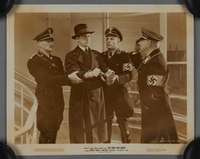
So Ends Our Night, U.S. Scene Still
Object
This object is one of more than 1,200 objects in the Cinema Judaica Collection of materials related to films about World War II and the Holocaust as well as Jewish, Israeli, and biblical themes.
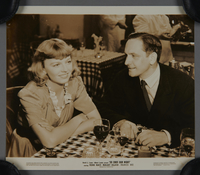
Scene still for the film “So Ends Our Night” (1941)
Object
Scene still for the American feature film, “So Ends Our Night,” released in the United States in February 1941, and re-released in 1948. Scene stills are photographs taken on or off the set of a motion picture and are then used as marketing and advertising tools. “So Ends Our Night” was an independently produced adaptation of the 1939 novel, “Flotsam,” by Erich Maria Remarque. Remarque was a German veteran of World War I, who became famous for writing “All Quiet on the Western Front” about war and the experiences of German soldiers. After Hitler was appointed Chancellor of Germany in 1933, Remarque’s works were deemed “unpatriotic” and banned. He fled for Switzerland, had his German citizenship revoked in 1938, and immigrated to the United States just before the start of World War II. “So Ends Our Night” begins in 1937 and focuses on three German refugees, whose paths cross on multiple occasions as they move throughout Western Europe to flee Nazi persecution. It highlights the predicament of (largely Jewish) refugees who are unable to obtain the legal documentation needed to enter or settle in free countries. It was one of the first Hollywood film to focus on the experiences of refugees. Despite a revised marketing campaign, the film was widely viewed as too solemn, slow, and lacking in drama. This object is one of more than 1,200 objects in the Cinema Judaica Collection of materials related to films about World War II and the Holocaust as well as Jewish, Israeli, and biblical themes.
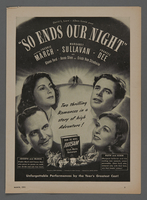
Magazine advertisement for the film “So Ends Our Night” (1941)
Object
Magazine advertisement for the American feature film, “So Ends Our Night,” released in the United States in February 1941, and re-released in 1948. “So Ends Our Night” was an independently produced adaptation of the 1939 novel, “Flotsam,” by Erich Maria Remarque. Remarque was a German veteran of World War I, who became famous for writing “All Quiet on the Western Front” about war and the experiences of German soldiers. After Hitler was appointed Chancellor of Germany in 1933, Remarque’s works were deemed “unpatriotic” and banned. He fled for Switzerland, had his German citizenship revoked in 1938, and immigrated to the United States just before the start of World War II. “So Ends Our Night” begins in 1937 and focuses on three German refugees, whose paths cross on multiple occasions as they move throughout Western Europe to flee Nazi persecution. It highlights the predicament of (largely Jewish) refugees who are unable to obtain the legal documentation needed to enter or settle in free countries. It was one of the first Hollywood film to focus on the experiences of refugees. Despite a revised marketing campaign, the film was widely viewed as too solemn, slow, and lacking in drama. This object is one of more than 1,200 objects in the Cinema Judaica Collection of materials related to films about World War II and the Holocaust as well as Jewish, Israeli, and biblical themes.
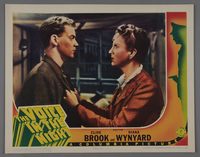
Set of four lobby cards for the film “The Voice in the Night” (1941)
Object
Set of four lobby cards for the British film, “The Voice in the Night,” originally released as “Freedom Radio” in February 1941. Lobby cards are promotional materials placed in theater lobby windows to highlight specific movie scenes, rather than the broader themes often depicted on posters. The film tells the story of a doctor in Germany who leads an underground group that produces a resistance radio broadcast. At the same time, his wife receives a political appointment in Berlin, and they encounter problems with each other and with Nazi officials. The American distributor changed the title from one that clearly was politically charged, to one that offered more suspense. This object is one of more than 1,200 objects in the Cinema Judaica Collection of materials related to films about World War II and the Holocaust as well as Jewish, Israeli, and biblical themes.
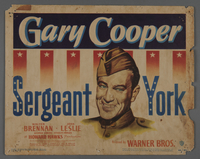
Set of three lobby cards for the film “Sergeant York” (1941)
Object
Set of three lobby cards for the American rerelease of the film, “Sergeant York,” originally released in July 1941, and rereleased in 1949. Lobby cards are promotional materials placed in theater lobby windows to highlight specific movie scenes, rather than the broader themes often depicted on posters. “Sergeant York” was the top grossing film of 1941 and was nominated for nine Academy Awards, winning two, for Best Film Editing, and Best Actor for Gary Cooper’s portrayal of the title character. The film was based on the life of Alvin York, a veteran of World War I who lived in the Cumberland Mountains of Tennessee. Initially a pacifist, whose registration as a conscientious objector was denied, York became a war hero during the battle of Argonne in October 1918. The real-life Alvin York won the Medal of Honor for his actions and became an international celebrity after the war. The film opened shortly after Hitler’s invasion of the Soviet Union in June 1941, and the theme of shifting from pacifism to active participation in the war mirrored the national interventionist debate in the months leading up to the US entry into World War II. In the years preceding the United States’ entry into the war, York became a well-known interventionist speaker, denouncing Hitler and antisemitism. This object is one of more than 1,200 objects in the Cinema Judaica Collection of materials related to films about World War II and the Holocaust as well as Jewish, Israeli, and biblical themes.
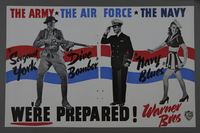
Trade advertisement for Warner Brothers films, including “Sergeant York” (1941)
Object
Double-page British trade advertisement for Warner Bros. films, including “Sergeant York,” released in July 1941. Movie manufacturers send trade advertisements to exhibitors to increase the distribution of a film to as many theaters as possible. “Sergeant York” was the top grossing film of 1941 and was nominated for nine Academy Awards, winning two, for Best Film Editing, and Best Actor for Gary Cooper’s portrayal of the title character. The film was based on the life of Alvin York, a veteran of World War I who lived in the Cumberland Mountains of Tennessee. Initially a pacifist, whose registration as a conscientious objector was denied, York became a war hero during the battle of Argonne in October 1918. The real-life Alvin York won the Medal of Honor for his actions and became an international celebrity after the war. The film opened shortly after Hitler’s invasion of the Soviet Union in June 1941, and the theme of shifting from pacifism to active participation in the war mirrored the national interventionist debate in the months leading up to the US entry into World War II. In the years preceding the United States’ entry into the war, York became a well-known interventionist speaker, denouncing Hitler and antisemitism. This object is one of more than 1,200 objects in the Cinema Judaica Collection of materials related to films about World War II and the Holocaust as well as Jewish, Israeli, and biblical themes.
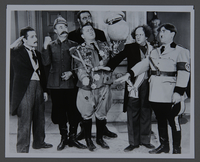
Set of three scene stills for the film “I'll Never Heil Again” (1941)
Object
Set of three scene stills for the Three Stooges short satire, “I’ll Never Heil Again,” released by Columbia Pictures, in July 1941. Scene stills are photographs taken on or off the set of a motion picture and are then used as marketing and advertising tools. The film was the Stooges’ first sequel, a follow up to the 1940 short, “You Nazty Spy.” In “I’ll Never Heil Again,” the Stooges (who were Jewish) play parodies of Hitler, Göring, and Goebbels, as Dictator Heilstone, Field Marshal Herring, and the Minister of Propaganda. They have taken control of the country of “Moronica,” and along with their allies (parodies of delegates from Japan, Italy, Turkey, and the Soviet Union), they make plans to conquer the globe. Before they can take action, they are killed by a bomb on the Dictator’s pool table, hidden by the daughter of the deposed king. Through a thinly veiled parody, the short commentates on the real-world alliance between Germany, Japan, Italy, Turkey, and the Soviet Union. In 1936, Germany began signing a series of treaties that culminated in the August 1939 German-Soviet Pact (also known as the Ribbentrop-Molotov Pact), and the September 1940 Tripartite Pact, uniting Germany, Italy, and Japan into the Axis alliance. However, in June 1941, shortly before the release of “I’ll Never Heil Again,” Germany invaded the Soviet Union, violating their nonaggression agreement and leading the Soviet Union to join the Allies. This object is one of more than 1,200 objects in the Cinema Judaica Collection of materials related to films about World War II and the Holocaust as well as Jewish, Israeli, and biblical themes.
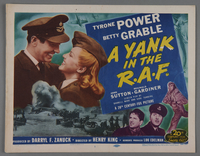
Lobby Card for the film “A Yank in the R.A.F.” (1941)
Object
Lobby card for the American film, “A Yank in the R.A.F,” released in September 1941 by 20th Century-Fox. Lobby cards are promotional materials placed in theater lobby windows to highlight specific movie scenes, rather than the broader themes often depicted on posters. The film tells the story of a young American pilot who, after ferrying a warplane to Great Britain, runs into his ex-girlfriend, who has joined the Women’s Auxiliary Air Force. To remain close to her, the pilot volunteers for the Royal Air Force (R.A.F.), and is assigned to the squadron of a competing suitor. He is eventually shot down during the Battle of Dunkirk, but manages to survive and return to his love. Not only did the R.A.F. provide the studio with stock footage, but they also helped film the aerial battle scenes. They mounted automatic cameras to gun carriages on some of their planes, enabling them to shoot footage of actual skirmishes. During one of these dogfights, two studio cameramen were killed when their plane was shot down. The film was released prior to the United States entering World War II, and promoted Americans who were already at war. At the beginning of September 1941, prior to the film’s release, producer Darryl F. Zanuck testified before a Senate subcommittee investigating Hollywood’s alleged violations of the Neutrality Act. This object is one of more than 1,200 objects in the Cinema Judaica Collection of materials related to films about World War II and the Holocaust as well as Jewish, Israeli, and biblical themes.
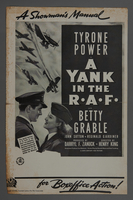
Pressbook cover for the film “A Yank in the R.A.F.” (1941)
Object
Cover to a pressbook for the American film, “A Yank in the R.A.F,” released in September 1941 by 20th Century-Fox. The film tells the story of a young American pilot who, after ferrying a warplane to Great Britain, runs into his ex-girlfriend, who has joined the Women’s Auxiliary Air Force. To remain close to her, the pilot volunteers for the Royal Air Force (R.A.F.), and is assigned to the squadron of a competing suitor. He is eventually shot down during the Battle of Dunkirk, but manages to survive and return to his love. Not only did the R.A.F. provide the studio with stock footage, but they also helped film the aerial battle scenes. They mounted automatic cameras to gun carriages on some of their planes, enabling them to shoot footage of actual skirmishes. During one of these dogfights, two studio cameramen were killed when their plane was shot down. The film was released prior to the United States entering World War II, and promoted Americans who were already at war. At the beginning of September 1941, prior to the film’s release, producer Darryl F. Zanuck testified before a Senate subcommittee investigating Hollywood’s alleged violations of the Neutrality Act. This object is one of more than 1,200 objects in the Cinema Judaica Collection of materials related to films about World War II and the Holocaust as well as Jewish, Israeli, and biblical themes.
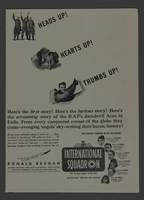
Magazine advertisement for the film “International Squadron” (1941)
Object
Magazine advertisement for the American feature film, “International Squadron,” released by Warner Bros. Pictures in October 1941. The film tells the story of a young American pilot who ferries a warplane to Great Britain. After surviving a bombing by the Germans, the pilot volunteers for the Royal Air Force (R.A.F.). His recklessness during a patrol leads to the death of another member of the R.A.F., and later selfishness leads to the death of a close friend. He then volunteers for a dangerous mission, but is shot down and killed on his return trip. The film is based on the real-life “Eagle Squadrons” that consisted of Americans who volunteered for the R.A.F. before the United States entered World War II. This became a hot topic in Hollywood, and Darryl Zanuck, the producer of the 20th Century-Fox film “A Yank in the R.A.F.” accused Warner Bros. of stealing his idea, and threatened legal action. The technical advisor for “International Squadron,” Byron Kennerly, had himself been a member of an Eagle Squadron and later served in the U.S. Army Air Forces. During the filming, technicians from Warner Bros. traveled to Britain to film aerial skirmishes and an air raid in London. This object is one of more than 1,200 objects in the Cinema Judaica Collection of materials related to films about World War II and the Holocaust as well as Jewish, Israeli, and biblical themes.
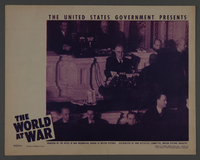
Pair of lobby cards for the film “The World at War” (1941)
Object
Pair of lobby cards for the American film, “The World at War,” released by the United States Government in September 1942. Lobby cards are promotional materials placed in theater lobby windows to highlight specific movie scenes, rather than the broader themes often depicted on posters. This documentary film chronicles the decade leading up to the U.S. entry into World War II, and highlights the pre-war debate within the country between isolationists and interventionists. It includes clips of Germany’s invasion of the Soviet Union, the aftermath of the Japanese attack on Pearl Harbor, and President Roosevelt’s famous “Infamy” speech following the attack. Comprised of newsreel footage and films captured from the Nazis, it was the first feature-length film produced by the U.S. Government and the first wartime propaganda film made by the Office of War Information (OWI). With cooperation of the major Hollywood distributors (20th Century-Fox, MGM, Paramount, RKO, and Warner Bros.), it was released to theaters free of charge. This object is one of more than 1,200 objects in the Cinema Judaica Collection of materials related to films about World War II and the Holocaust as well as Jewish, Israeli, and biblical themes.
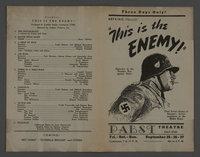
Advertisement for the film “This is the Enemy” (1942)
Object
Theater advertisement for the Soviet film, “This Is the Enemy,” released in the United States in July 1942. The film was originally released in two parts in the Soviet Union in August 1941, under the name “Boyevoy Kinosbornik” (Battle Film Collection). It is a propaganda film that begins with Germany breaking their 1939 non-aggression pact and invading the Soviet Union. It is comprised of eight segments, with seven directors and eight writers. At the request of President Roosevelt, a single-film version was released in the United States over the Independence Day weekend. Advertisements for the film showed Germans as pillagers and rapists of Eastern Europe. The marketing attempted to unify the Soviet Union and United States against their common, brutal enemy, Nazi Germany. Following the U.S. entrance into the war seven months prior, restrictions on the dissemination of propaganda loosened, and “This Is the Enemy” served as a precursor to the release of more shocking films that followed. This object is one of more than 1,200 objects in the Cinema Judaica Collection of materials related to films about World War II and the Holocaust as well as Jewish, Israeli, and biblical themes.
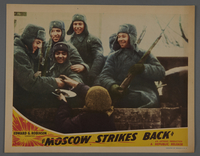
Set of seven lobby cards for the film “Moscow Strikes Back” (1942)
Object
Set of seven lobby cards for the documentary film, “Moscow Strikes Back,” released in the United States in October 1942. Lobby cards are promotional materials placed in theater lobby windows to highlight specific movie scenes, rather than the broader themes often depicted on posters. Narrated by Edward G. Robinson, Hollywood’s biggest Jewish star, the film was one of four to win an Academy Award for Best Documentary in 1942. It depicted the Battle of Moscow and the Soviet Union’s counteroffensive against the German invaders, beginning in December 1941. The footage was shot by cameramen with the Soviet army, some of whom were killed in the process. It was then edited into the final product in the United States, largely by Russian-Americans. When “Moscow Strikes Back” was released, Allied forces were faring poorly, suffering a string of defeats in North Africa and the Pacific The film became a major morale booster for the American public. This object is one of more than 1,200 objects in the Cinema Judaica Collection of materials related to films about World War II and the Holocaust as well as Jewish, Israeli, and biblical themes.
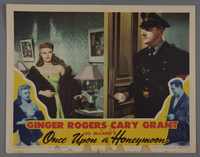
Pair of lobby cards for the film “Once Upon a Honeymoon” (1942)
Object
Pair of lobby cards for the American feature film, “Once Upon a Honeymoon,” released by RKO Radio Pictures in November 1942. Lobby cards are promotional materials placed in theater lobby windows to highlight specific movie scenes, rather than the broader themes often depicted on posters. The film tells the story of an American journalist in Europe, who falls in love with an American burlesque dancer posing as a socialite, who marries an Austrian baron. After discovering that the baron is a Nazi secret agent, the two Americans are accidentally thrown into a concentration camp. They secure their release and begin following the baron across Western Europe. Most of the marketing billed the film as a romantic escapade, and many reviewers called it tasteless in light of the atrocities occurring in Nazi-controlled Europe. This object is one of more than 1,200 objects in the Cinema Judaica Collection of materials related to films about World War II and the Holocaust as well as Jewish, Israeli, and biblical themes.
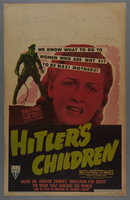
U.S. Window Card for the film “Hitler’s Children” (1943)
Object
Window card for the American feature film, “Hitler’s Children,” released by RKO Radio Pictures in January 1943. Window cards were mass-produced promotional materials used until the mid-1980s. They included a blank section at the top for individual theaters to write in dates and show times, and placed in locations outside of the theaters. “Hitler’s Children” was adapted from Gregor Ziemer’s novel, “Education For Death,” which was based on the author’s experiences and observations as the former headmaster of Berlin’s American Colony School. The film focuses on a young American woman in Germany, who denounces Nazi ideology and the state-sanctioned treatment of women as vessels for procreation, and is forced into a labor camp. After running away, she is subjected to public flogging and is eventually executed. The film was one of the first of several films to feature the theme of women persecuted by Nazi Germany. This object is one of more than 1,200 objects in the Cinema Judaica Collection of materials related to films about World War II and the Holocaust as well as Jewish, Israeli, and biblical themes.
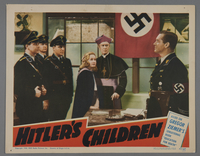
Lobby card for the film “Hitler’s Children” (1943)
Object
Lobby card for the American feature film, “Hitler’s Children,” released by RKO Radio Pictures in January 1943. Lobby cards are promotional materials placed in theater lobby windows to highlight specific movie scenes, rather than the broader themes often depicted on posters. “Hitler’s Children” was adapted from Gregor Ziemer’s novel, “Education For Death,” which was based on the author’s experiences and observations as the former headmaster of Berlin’s American Colony School. The film focuses on a young American woman in Germany, who denounces Nazi ideology and the state-sanctioned treatment of women as vessels for procreation, and is forced into a labor camp. After running away, she is subjected to public flogging and is eventually executed. The film was one of the first of several films to feature the theme of women persecuted by Nazi Germany. This object is one of more than 1,200 objects in the Cinema Judaica Collection of materials related to films about World War II and the Holocaust as well as Jewish, Israeli, and biblical themes.
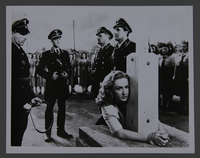
Scene still from the film “Hitler’s Children” (1943)
Object
Scene still for the American feature film, “Hitler’s Children,” released by RKO Radio Pictures in January 1943. Scene stills are photographs taken on or off the set of a motion picture and are then used as marketing and advertising tools. “Hitler’s Children” was adapted from Gregor Ziemer’s novel, “Education For Death,” which was based on the author’s experiences and observations as the former headmaster of Berlin’s American Colony School. The film focuses on a young American woman in Germany, who denounces Nazi ideology and the state-sanctioned treatment of women as vessels for procreation, and is forced into a labor camp. After running away, she is subjected to public flogging and is eventually executed. The film was one of the first of several films to feature the theme of women persecuted by Nazi Germany. This object is one of more than 1,200 objects in the Cinema Judaica Collection of materials related to films about World War II and the Holocaust as well as Jewish, Israeli, and biblical themes.
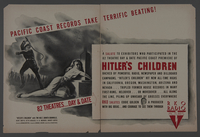
Trade advertisement for the film “Hitler’s Children” (1943)
Object
Trade advertisement for the American feature film, “Hitler’s Children,” released by RKO Radio Pictures in January 1943. Movie manufacturers send trade advertisements to exhibitors to increase the distribution of a film to as many theaters as possible. “Hitler’s Children” was adapted from Gregor Ziemer’s novel, “Education For Death,” which was based on the author’s experiences and observations as the former headmaster of Berlin’s American Colony School. The film focuses on a young American woman in Germany, who denounces Nazi ideology and the state-sanctioned treatment of women as vessels for procreation, and is forced into a labor camp. After running away, she is subjected to public flogging and is eventually executed. The film was one of the first of several films to feature the theme of women persecuted by Nazi Germany. This object is one of more than 1,200 objects in the Cinema Judaica Collection of materials related to films about World War II and the Holocaust as well as Jewish, Israeli, and biblical themes.
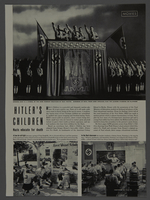
Magazine advertisement for the film “Hitler’s Children” (1943)
Object
Magazine advertisement for the American feature film, “Hitler’s Children,” released by RKO Radio Pictures in January 1943.“Hitler’s Children” was adapted from Gregor Ziemer’s novel, “Education For Death,” which was based on the author’s experiences and observations as the former headmaster of Berlin’s American Colony School. The film focuses on a young American woman in Germany, who denounces Nazi ideology and the state-sanctioned treatment of women as vessels for procreation, and is forced into a labor camp. After running away, she is subjected to public flogging and is eventually executed. The film was one of the first of several films to feature the theme of women persecuted by Nazi Germany. This object is one of more than 1,200 objects in the Cinema Judaica Collection of materials related to films about World War II and the Holocaust as well as Jewish, Israeli, and biblical themes.
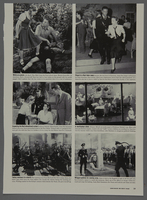
Article about the films “Hitler’s Children” (1943) and “Education for Death” (1943) from Life Magazine
Object
Article from the February 1, 1943 issue of “Life” Magazine, featuring photos and text relating to the films, “Hitler’s Children” and “Education for Death.” Both films were adapted from Gregor Ziemer’s novel, “Education For Death,” which was based on the author’s experiences and observations as the former headmaster of Berlin’s American Colony School. “Hitler’s Children” focused on a young American woman in Germany, who denounced Nazi ideology and the state-sanctioned treatment of women as vessels for procreation, was forced into a labor camp, subjected to public flogging, and eventually executed. The film, “Education for Death,” was an animated short by Walt Disney Productions, and centered on a young German boy who is indoctrinated with Nazi ideology, and becomes a mindless soldier devoted to Adolf Hitler. It was one of 32 propaganda shorts Disney produced under a contract for the United States government. In addition to propaganda, the Disney studios also produced a series of instructional films for government and military personnel. This object is one of more than 1,200 objects in the Cinema Judaica Collection of materials related to films about World War II and the Holocaust as well as Jewish, Israeli, and biblical themes.
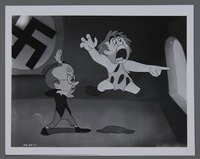
Pair of scene stills for the film “Reason and Emotion” (1943)
Object
Two scene stills from the animated short film, “Reason and Emotion,” released by RKO Radio Pictures in August 1943. Scene stills are photographs relating to the film and used as marketing and advertising tools. The film was nominated for the 1943 Academy Award for best cartoon short. Created by Walt Disney Productions, the film features the characters “Reason” and “Emotion,” personified by stereotypes of an intellectual and a caveman. They are introduced in the mind of a toddler, and accompany him into his adult years. Reason and Emotion are also shown in the mind of a woman, and in an ideal Nazi man. The film argues that Hitler destroys Reason by taking advantage of the weaknesses in Emotion, and includes a scene where Emotion imprisons Reason in a miniature concentration camp. It urges the audience to remain calm, let Reason lead, and not let their emotions be manipulated. “Reason and Emotion” was one of 32 propaganda shorts Disney produced under a contract for the United States government. In addition to propaganda, the Disney studios also produced a series of instructional films for government and military personnel. This object is one of more than 1,200 objects in the Cinema Judaica Collection of materials related to films about World War II and the Holocaust as well as Jewish, Israeli, and biblical themes.
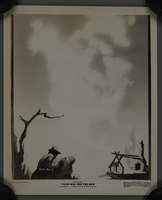
Scene still for the film “Food Will Win the War” (1942)
Object
Scene still from the animated short film, “Food Will Win the War,” released by RKO Radio Pictures in July 1942. Scene stills are photographs relating to the film and used as marketing and advertising tools. Created by Walt Disney Productions, the film was commissioned by the United States Department of Agriculture shortly after the bombing of Pearl Harbor in December 1941. It boasts about the extensive agricultural output of the United States, and the role it could play in defeating the Axis powers. By personifying the Axis powers and their weapons as the villains threatening beloved characters from the 1930s, such as the Three Little Pigs, the filmmakers enabled the audience to feel the threat more viscerally while remaining far from the frontlines. “Food Will Win the War” was one of many propaganda shorts Disney produced under a contract for the United States government. In addition to propaganda, the Disney studios also produced a series of instructional films for government and military personnel. This object is one of more than 1,200 objects in the Cinema Judaica Collection of materials related to films about World War II and the Holocaust as well as Jewish, Israeli, and biblical themes.
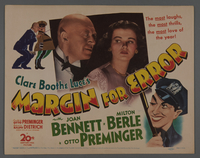
Set of three lobby cards for the film “Margin for Error” (1943)
Object
Set of three lobby cards for the American feature film, “Margin for Error,” released by 20th Century-Fox in February 1943. Lobby cards are promotional materials placed in theater lobby windows to highlight specific movie scenes, rather than the broader themes often depicted on posters. The film is based on the 1939 Broadway play written by Clare Boothe Luce. Otto Preminger, who directed and headlined the play, also directed and starred in the film. The film takes place at the Nazi-run German consulate in pre-World War II New York City, where a Jewish policeman is assigned as a guard, becomes friends with some of the residents, and observes both personal and political turmoil. The Consul enlists the leader of the German-American Bund in a plot to bomb an American port, which is ultimately unsuccessful. The premise was based on an actual 1938 event in which New York City mayor, Fiorello La Guardia, assigned a detail of Jewish policemen to guard the Nazi German consulate. The government-controlled press in Germany perceived this act as an insult. This object is one of more than 1,200 objects in the Cinema Judaica Collection of materials related to films about World War II and the Holocaust as well as Jewish, Israeli, and biblical themes.
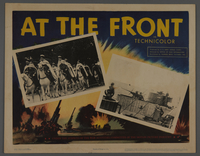
Lobby card for the film “At the Front in North Africa” (1943)
Object
Lobby card for the documentary film, “At the Front in North Africa” (also known as “At the Front”), shot by the U.S. Army Signal Corps in November and December 1942, and released to the public in March 1943. Lobby cards are promotional materials placed in theater lobby windows to highlight specific movie scenes, rather than the broader themes often depicted on posters. “At the Front” documented the early Allied campaign in Algeria and Tunisia. Darryl F. Zanuck, 20th Century-Fox production head and an Army colonel, led the Signal Corps unit that shot the footage, while Hollywood director, John Ford, directed the Navy unit. The film was heavily criticized for its lack of a storyline and overall poor quality, in comparison to other wartime documentaries. Zanuck argued that the film was intended to be viewed as a newsreel report more than a documentary, which he equated with skillfully edited propaganda that included staged reenactments and intended to impart a particular message. This object is one of more than 1,200 objects in the Cinema Judaica Collection of materials related to films about World War II and the Holocaust as well as Jewish, Israeli, and biblical themes.
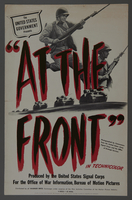
Pressbook cover for the film “At the Front in North Africa” (1943)
Object
Cover removed from a pressbook for the documentary film, “At the Front in North Africa,” (also known as “At the Front”) shot by the U.S. Army Signal Corps in November and December 1942, and released to the public in March 1943. “At the Front” documented the early Allied campaign in Algeria and Tunisia. Darryl F. Zanuck, 20th Century-Fox production head and an Army colonel, led the Signal Corps unit that shot the footage, while Hollywood director, John Ford, directed the Navy unit. The film was heavily criticized for its lack of a storyline and overall poor quality, in comparison to other wartime documentaries. Zanuck argued that the film was intended to be viewed as a newsreel report more than a documentary, which he equated with skillfully edited propaganda that included staged reenactments and intended to impart a particular message. This object is one of more than 1,200 objects in the Cinema Judaica Collection of materials related to films about World War II and the Holocaust as well as Jewish, Israeli, and biblical themes.

Trade advertisement for the “This is America” film series that includes “Women at Arms” (1943)
Object
Double-page trade advertisement for the film series, “This Is America,” including the short film “Women at Arms,” removed from a British trade publication. “This Is America” was a series of nonfiction, patriotic short films released by RKO. The second of the series, “Women at Arms” contrasted the wartime roles of women in the United States and Germany. In the 1930s and 1940s, the Nazi government idealized German women who focused on the domestic sphere and raising children, and were often compelled to leave the workplace. The government offered public support for families, and awarded the Cross of Honor of the German Mother to women who bore four or more children. Despite the plethora of propaganda on the role of the ideal German woman, wartime needs led to a different reality. All school-age girls attended summer labor camps, and single women were obliged to participate in the Duty Year of compulsory-service. By 1945, the German army included almost 500,000 auxiliaries. In contrast to the ideal German woman, “Women at Arms” shows American women taking over a large number of manufacturing jobs vacated by men who joined, or were drafted into, the armed forces. After the United States entered World War II in December 1941, over 2 million women joined the workforce. The need in manufacturing was so great that a federal agency, the War Manpower Commission, began actively recruiting women. As men returned from the war, however, many women were forced out of their jobs despite their desire to continue working. This object is one of more than 1,200 objects in the Cinema Judaica Collection of materials related to films about World War II and the Holocaust as well as Jewish, Israeli, and biblical themes.
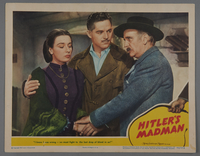
Lobby card for the film “Hitler’s Madman” (1943)
Object
Lobby card for the American feature film, “Hitler’s Madman,” released by Metro-Goldwyn-Mayer in June 1943. Lobby cards are promotional materials placed in theater lobby windows to highlight specific movie scenes, rather than the broader themes often depicted on posters. “Hitler’s Madman” is a fictionalized portrayal of the assassination and of Reinhard Heydrich and its aftermath. Heydrich was Heinrich Himmler’s second-in-command and chief of the Reich Security Main office (Reichssicherheitshauptamt, RSHA), which was the major implementer of the systematic murder of European Jews. He was especially brutal, earning the nicknames “The Hangman of Europe” and “Hitler’s Hangman.” Under Heydrich’s leadership, over 34,000 Jews were deported from Theresienstadt ghetto-labor camp in German-occupied Czechoslovakia. On May 27, 1942, two British-trained Czech agents rolled a hand grenade under Heydrich’s vehicle. Splinters from the resulting explosion led to an infection that killed him. On June 10, 1942, in retaliation for Heydrich’s death, the Nazis targeted the village of Lidice in Czechoslovakia. 192 men and boys were executed by firing squad, and 203 women were deported to Ravensbrück concentration camp, 60 of whom died in the camp system. Additionally, 82 children were likely deported to Chelmno and killed in mobile gas chambers. The Germans then destroyed the buildings and razed the town. This object is one of more than 1,200 objects in the Cinema Judaica Collection of materials related to films about World War II and the Holocaust as well as Jewish, Israeli, and biblical themes.
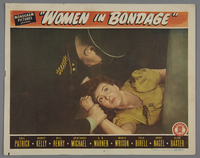
Set of four lobby cards for the film “Women in Bondage” (1944)
Object
Set of four lobby cards for the American feature film, “Women in Bondage,” released by Monogram Pictures in January 1944. Lobby cards were promotional materials placed in theater lobby windows to highlight specific movie scenes, rather than the broader themes often depicted on posters. The film depicts the degradation in status that women experienced in Nazi-controlled Germany. The protagonist, Margot Bracken, returns to Germany after years away, and has difficulties conforming to her new role in the Third Reich. To create their new Aryan Germany, throughout the 1930s, the Nazi government glorified Aryan German women who focused on the domestic sphere and raising children. From the age of 10, girls were compelled to join the Nazi League of German Girls (Bund Deutscher Mädel; BDM) and attended summer labor camps, where they were indoctrinated with gender appropriate Nazi ideology. The Nazis encouraged “racially pure” women to have multiple children, but banned those with handicaps or certain diseases from marrying. The government offered public support for families, and awarded the Cross of Honor of the German Mother to women who bore four or more children. Both the director and producer of “Women in Bondage” observed this culture first hand, as German Jews who fled Berlin after Hitler came to power in 1933. The writer of the original story also left Germany after his production company was seized and nationalized to make Nazi propaganda. This object is one of more than 1,200 objects in the Cinema Judaica Collection of materials related to films about World War II and the Holocaust as well as Jewish, Israeli, and biblical themes.
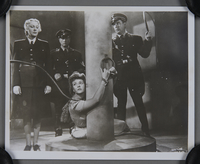
Scene still from the film “Women in Bondage” (1944)
Object
Scene still for the American feature film, “Women in Bondage,” released by Monogram Pictures in January 1944. Scene stills are photographs taken on or off the set of a motion picture and are then used as marketing and advertising tools. The film depicts the degradation in status that women experienced in Nazi-controlled Germany. The protagonist, Margot Bracken, returns to Germany after years away, and has difficulties conforming to her new role in the Third Reich. To create their new Aryan Germany, throughout the 1930s, the Nazi government glorified Aryan German women who focused on the domestic sphere and raising children. From the age of 10, girls were compelled to join the Nazi League of German Girls (Bund Deutscher Mädel; BDM) and attended summer labor camps, where they were indoctrinated with gender appropriate Nazi ideology. The Nazis encouraged “racially pure” women to have multiple children, but banned those with handicaps or certain diseases from marrying. The government offered public support for families, and awarded the Cross of Honor of the German Mother to women who bore four or more children. Both the director and producer of “Women in Bondage” observed this culture first hand, as German Jews who fled Berlin after Hitler came to power in 1933. The writer of the original story also left Germany after his production company was seized and nationalized to make Nazi propaganda. This object is one of more than 1,200 objects in the Cinema Judaica Collection of materials related to films about World War II and the Holocaust as well as Jewish, Israeli, and biblical themes.
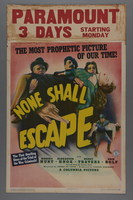
Window card for the film “None Shall Escape” (1944)
Object
Window card for the film, “None Shall Escape,” released by Columbia Pictures in 1944. Window cards were mass-produced promotional materials used until the mid-1980s. They included a blank section at the top for individual theaters to write in dates and show times, and were placed in locations outside of the theaters. “None Shall Escape” was nominated for the Academy Award for Best Original Story. The film jumps between a fictionalized post-World War II war crimes trial of a Nazi officer from Poland, and the events leading up to and during the war. The man is embittered after Germany’s defeat in World War I, becomes a follower of Adolf Hitler, rises in the ranks of the Nazi party, and returns to terrorize his home village. The film was inspired by President Franklin Roosevelt’s announcement that the United Nations’ intention of identifying Nazi leaders, and called for them to be tried for war crimes. It not only depicted the Nazi persecution of women, but also their persecution of Jews. The film depicted the mass killing of Jews by German machine gunners, and featured a rabbi as a central character. Although the film was released 15 months before the end of the war, it bore strong parallels to the 1961 trial of Adolf Eichmann, following his capture in Argentina by the Israeli Mossad. Unlike the Nuremburg trials, the Eichmann trial featured the testimonies of Holocaust survivors. This object is one of more than 1,200 objects in the Cinema Judaica Collection of materials related to films about World War II and the Holocaust as well as Jewish, Israeli, and biblical themes.
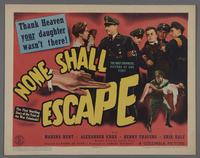
Set of six lobby cards for the film “None Shall Escape” (1944)
Object
Set of six lobby cards for the film, “None Shall Escape,” released by Columbia Pictures in 1944. Lobby cards are promotional materials placed in theater lobby windows to highlight specific movie scenes, rather than the broader themes often depicted on posters. “None Shall Escape” was nominated for the Academy Award for Best Original Story. The film jumps between a fictionalized post-World War II war crimes trial of a Nazi officer from Poland, and the events leading up to and during the war. The man is embittered after Germany’s defeat in World War I, becomes a follower of Adolf Hitler, rises in the ranks of the Nazi party, and returns to terrorize his home village. The film was inspired by President Franklin Roosevelt’s announcement that the United Nations’ intention of identifying Nazi leaders, and called for them to be tried for war crimes. It not only depicted the Nazi persecution of women, but also their persecution of Jews. The film depicted the mass killing of Jews by German machine gunners, and featured a rabbi as a central character. Although the film was released 15 months before the end of the war, it bore strong parallels to the 1961 trial of Adolf Eichmann, following his capture in Argentina by the Israeli Mossad. Unlike the Nuremburg trials, the Eichmann trial featured the testimonies of Holocaust survivors. This object is one of more than 1,200 objects in the Cinema Judaica Collection of materials related to films about World War II and the Holocaust as well as Jewish, Israeli, and biblical themes.
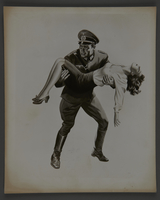
Artwork print for the film “None Shall Escape” (1944)
Object
Photographic print of an illustration advertising the film, “None Shall Escape,” released by Columbia Pictures in 1944. “None Shall Escape” was nominated for the Academy Award for Best Original Story. The film jumps between a fictionalized post-World War II war crimes trial of a Nazi officer from Poland, and the events leading up to and during the war. The man is embittered after Germany’s defeat in World War I, becomes a follower of Adolf Hitler, rises in the ranks of the Nazi party, and returns to terrorize his home village. The film was inspired by President Franklin Roosevelt’s announcement that the United Nations’ intention of identifying Nazi leaders, and called for them to be tried for war crimes. It not only depicted the Nazi persecution of women, but also their persecution of Jews. The film depicted the mass killing of Jews by German machine gunners, and featured a rabbi as a central character. Although the film was released 15 months before the end of the war, it bore strong parallels to the 1961 trial of Adolf Eichmann, following his capture in Argentina by the Israeli Mossad. Unlike the Nuremburg trials, the Eichmann trial featured the testimonies of Holocaust survivors. This object is one of more than 1,200 objects in the Cinema Judaica Collection of materials related to films about World War II and the Holocaust as well as Jewish, Israeli, and biblical themes.
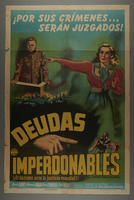
Argentine One Sheet poster for the film “None Shall Escape” (1944)
Object
Spanish-language, Argentinian poster advertising the film, “None Shall Escape,” released by Columbia Pictures in 1944. “None Shall Escape” was nominated for the Academy Award for Best Original Story. The film jumps between a fictionalized post-World War II war crimes trial of a Nazi officer from Poland, and the events leading up to and during the war. The man is embittered after Germany’s defeat in World War I, becomes a follower of Adolf Hitler, rises in the ranks of the Nazi party, and returns to terrorize his home village. The film was inspired by President Franklin Roosevelt’s announcement that the United Nations’ intention of identifying Nazi leaders, and called for them to be tried for war crimes. It not only depicted the Nazi persecution of women, but also their persecution of Jews. The film depicted the mass killing of Jews by German machine gunners, and featured a rabbi as a central character. Although the film was released 15 months before the end of the war, it bore strong parallels to the 1961 trial of Adolf Eichmann, following his capture in Argentina by the Israeli Mossad. Unlike the Nuremburg trials, the Eichmann trial featured the testimonies of Holocaust survivors. This object is one of more than 1,200 objects in the Cinema Judaica Collection of materials related to films about World War II and the Holocaust as well as Jewish, Israeli, and biblical themes.

Newspaper page featuring an advertisement for the film “None Shall Escape” (1944)
Object
Page removed from a Canadian publication, featuring an advertisement for the film, “None Shall Escape,” released by Columbia Pictures in 1944. “None Shall Escape” was nominated for the Academy Award for Best Original Story. The film jumps between a fictionalized post-World War II war crimes trial of a Nazi officer from Poland, and the events leading up to and during the war. The man is embittered after Germany’s defeat in World War I, becomes a follower of Adolf Hitler, rises in the ranks of the Nazi party, and returns to terrorize his home village. The film was inspired by President Franklin Roosevelt’s announcement that the United Nations’ intention of identifying Nazi leaders, and called for them to be tried for war crimes. It not only depicted the Nazi persecution of women, but also their persecution of Jews. The film depicted the mass killing of Jews by German machine gunners, and featured a rabbi as a central character. Although the film was released 15 months before the end of the war, it bore strong parallels to the 1961 trial of Adolf Eichmann, following his capture in Argentina by the Israeli Mossad. Unlike the Nuremburg trials, the Eichmann trial featured the testimonies of Holocaust survivors. This object is one of more than 1,200 objects in the Cinema Judaica Collection of materials related to films about World War II and the Holocaust as well as Jewish, Israeli, and biblical themes.
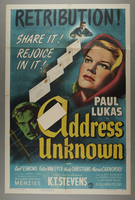
U.S. one-sheet poster for the movie, “Address Unknown” (1944)
Object
One-sheet poster for the American feature film “Address Unknown,” released in the United States on June 1, 1944. The film was based on the 1938 novella of the same name in “Story” magazine by Kressmann Taylor (penname for Katherine Taylor), and it was nominated for the Academy Awards for Art Direction and Music in 1944. The film tells the story of two German business partners in the United States, whose friendship and families are destroyed when one of them returns to Germany, and succumbs to the Nazi regime and its propaganda. When the businessman in Germany turns his back on the woman who is both his Jewish partner’s daughter and his own son’s fiancée, leading to her death, he begins receiving a series of incriminating letters from the U.S. The original novella became so popular that a shortened version of it was reprinted in “Reader’s Digest” in 1939, printed in hardcover in 1940, and was reissued in the late 20th century as an international bestseller. This object is one of more than 1,200 objects in the Cinema Judaica Collection of materials related to films about World War II and the Holocaust as well as Jewish, Israeli, and biblical themes.
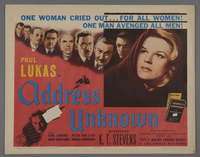
Set of six lobby cards for the movie, “Address Unknown” (1944)
Object
Set of six lobby cards for the American feature film, “Address Unknown,” released in the United States on June 1, 1944. Lobby cards are promotional materials placed in theater lobby windows to highlight specific movie scenes, rather than the broader themes often depicted on posters. The film was based on the 1938 novella of the same name in “Story” magazine by Kressmann Taylor (penname for Katherine Taylor), and it was nominated for the Academy Awards for Art Direction and Music in 1944. The film tells the story of two German business partners in the United States, whose friendship and families are destroyed when one of them returns to Germany, and succumbs to the Nazi regime and its propaganda. When the businessman in Germany turns his back on the woman who is both his Jewish partner’s daughter and his own son’s fiancée, leading to her death, he begins receiving a series of incriminating letters from the U.S. The original novella became so popular that a shortened version of it was reprinted in “Reader’s Digest” in 1939, printed in hardcover in 1940, and was reissued in the late 20th century as an international bestseller. This object is one of more than 1,200 objects in the Cinema Judaica Collection of materials related to films about World War II and the Holocaust as well as Jewish, Israeli, and biblical themes.
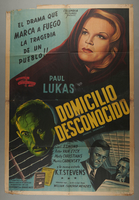
Argentine one-sheet poster for the movie, “Address Unknown” (1944)
Object
Argentine one-sheet poster, printed in 1946, for the American feature film “Address Unknown,” originally released in the United States on June 1, 1944. The film was based on the 1938 novella of the same name in “Story” magazine by Kressmann Taylor (penname for Katherine Taylor), and it was nominated for the Academy Awards for Art Direction and Music in 1944. The film tells the story of two German business partners in the United States, whose friendship and families are destroyed when one of them returns to Germany, and succumbs to the Nazi regime and its propaganda. When the businessman in Germany turns his back on the woman who is both his Jewish partner’s daughter and his own son’s fiancée, leading to her death, he begins receiving a series of incriminating letters from the U.S. The original novella became so popular that a shortened version of it was reprinted in “Reader’s Digest” in 1939, printed in hardcover in 1940, and was reissued in the late 20th century as an international bestseller. This object is one of more than 1,200 objects in the Cinema Judaica Collection of materials related to films about World War II and the Holocaust as well as Jewish, Israeli, and biblical themes.
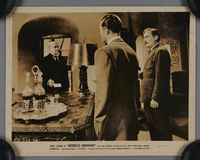
Set of two scene stills for the movie, “Address Unknown” (1944)
Object
Pair of scene stills for the American feature film, “Address Unknown,” released in the United States on June 1, 1944. Scene stills are photographs taken on or off the set of a motion picture and are then used as marketing and advertising tools. The film was based on the 1938 novella of the same name in “Story” magazine by Kressmann Taylor (penname for Katherine Taylor), and it was nominated for the Academy Awards for Art Direction and Music in 1944. The film tells the story of two German business partners in the United States, whose friendship and families are destroyed when one of them returns to Germany, and succumbs to the Nazi regime and its propaganda. When the businessman in Germany turns his back on the woman who is both his Jewish partner’s daughter and his own son’s fiancée, leading to her death, he begins receiving a series of incriminating letters from the U.S. The original novella became so popular that a shortened version of it was reprinted in “Reader’s Digest” in 1939, printed in hardcover in 1940, and was reissued in the late 20th century as an international bestseller. This object is one of more than 1,200 objects in the Cinema Judaica Collection of materials related to films about World War II and the Holocaust as well as Jewish, Israeli, and biblical themes.
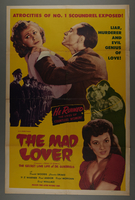
Re-release one-sheet poster for the film, “The Mad Lover” or “Enemy of Women” (1944)
Object
One-sheet poster for the 1952 re-release of the film, “The Mad Lover,” originally released as “Enemy of Women” in November 1944. The film begins in 1925, and shows a fictionalized account of a young Paul Joseph Goebbels as he rises through the ranks of the Nazi party. He becomes the Minister of Propaganda, earns a reputation as a womanizer, and exacts revenge on a woman who scorns his attention. The film was produced by W.R. Frank, the owner of a theater chain in Minneapolis, and directed by Alfred Zeisler, a German expatriate who claimed to have worked on propaganda films with Goebbels himself. The film focuses on Goebbels’s character and personal life, addressing his abuse of political position and power to his own advantage. This object is one of more than 1,200 objects in the Cinema Judaica Collection of materials related to films about World War II and the Holocaust as well as Jewish, Israeli, and biblical themes.
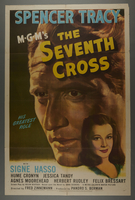
One-sheet poster for the film, “The Seventh Cross” (1944)
Object
One-sheet poster for the film, “The Seventh Cross,” released in September1944. The film was based on a 1942 novel of the same name by German author, Anna Seghers, who fled from the Nazi authorities to Mexico. “The Seventh Cross” takes place in 1936, in Germany, when seven Jewish and political prisoners escape from a concentration camp. Six are caught, killed, and tied to makeshift crosses, but a seventh escapee manages to elude the soldiers. While seeking help, the protagonist comes across many ordinary Germans (many of whom were portrayed by real-life German refugees), who prove to have complex motivations. Rather than equating all Germans with Nazism, it creates sympathy for the ordinary people. Throughout the film, the voice-over narration from one of the killed escapees reflects the undocumented perspective of the victims in the historical record. This object is one of more than 1,200 objects in the Cinema Judaica Collection of materials related to films about World War II and the Holocaust as well as Jewish, Israeli, and biblical themes.
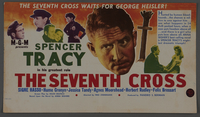
U.S. herald for the film, “The Seventh Cross” (1944)
Object
United States herald for the film, “The Seventh Cross,” released in September 1944. Heralds were small, inexpensive flyers usually included as part of a film’s press kit. The film was based on a 1942 novel of the same name by German author, Anna Seghers, who fled from the Nazi authorities to Mexico. “The Seventh Cross” takes place in 1936, in Germany, when seven Jewish and political prisoners escape from a concentration camp. Six are caught, killed, and tied to makeshift crosses, but a seventh escapee manages to elude the soldiers. While seeking help, the protagonist comes across many ordinary Germans (many of whom were portrayed by real-life German refugees), who prove to have complex motivations. Rather than equating all Germans with Nazism, it creates sympathy for the ordinary people. Throughout the film, the voice-over narration from one of the killed escapees reflects the undocumented perspective of the victims in the historical record. This object is one of more than 1,200 objects in the Cinema Judaica Collection of materials related to films about World War II and the Holocaust as well as Jewish, Israeli, and biblical themes.
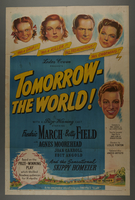
One-sheet poster for the film, “Tomorrow, the World!” (1944)
Object
One-sheet poster for the film, “Tomorrow, The World!” released by United Artists in December 1944. The film was based on a popular 1943 Broadway play of the same name, and centers around a 12-year-old member of the Hitler Youth who moves to the United States to live with his American uncle. Despite his parents’ deaths in a concentration camp, the young boy is entrenched in Nazi ideology, and is arrogant, insulting, and outwardly antagonistic towards his uncle’s Jewish fiancée. The adults debate over the best way to handle the boy, and by extension, Nazi Germany. After a more physical tactic ends in disaster, the characters find that a compassionate and loving approach breaks through. This serves as a metaphor for how to treat the ordinary German citizens living under the brutality of the Nazi regime. “Tomorrow, the World!” carries an underlying message that they were unwillingly forced into the Nazi ideology, and the film promotors even suggested that local discussions should held. This object is one of more than 1,200 objects in the Cinema Judaica Collection of materials related to films about World War II and the Holocaust as well as Jewish, Israeli, and biblical themes.

Insert poster for the film, “Tomorrow- the World!” (1944)
Object
Insert poster for the film, “Tomorrow, The World!” released by United Artists in December 1944. Insert posters were a popular size of film posters, often framed and used in special, small displays within a theater lobby. The film was based on a popular 1943 Broadway play of the same name, and centers around a 12-year-old member of the Hitler Youth who moves to the United States to live with his American uncle. Despite his parents’ deaths in a concentration camp, the young boy is entrenched in Nazi ideology, and is arrogant, insulting, and outwardly antagonistic towards his uncle’s Jewish fiancée. The adults debate over the best way to handle the boy, and by extension, Nazi Germany. After a more physical tactic ends in disaster, the characters find that a compassionate and loving approach breaks through. This serves as a metaphor for how to treat the ordinary German citizens living under the brutality of the Nazi regime. “Tomorrow, the World!” carries an underlying message that they were unwillingly forced into the Nazi ideology, and the film promotors even suggested that local discussions should held. This object is one of more than 1,200 objects in the Cinema Judaica Collection of materials related to films about World War II and the Holocaust as well as Jewish, Israeli, and biblical themes.
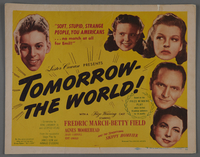
Set of six lobby cards for the movie, “Tomorrow- the World!” (1944)
Object
Set of six lobby cards for the film, “Tomorrow- The World!” released by United Artists in December 1944. Lobby cards are promotional materials placed in theater lobby windows to highlight specific movie scenes, rather than the broader themes often depicted on posters. The film was based on a popular 1943 Broadway play of the same name, and centers around a 12-year-old member of the Hitler Youth who moves to the United States to live with his American uncle. Despite his parents’ deaths in a concentration camp, the young boy is entrenched in Nazi ideology, and is arrogant, insulting, and outwardly antagonistic towards his uncle’s Jewish fiancée. The adults debate over the best way to handle the boy, and by extension, Nazi Germany. After a more physical tactic ends in disaster, the characters find that a compassionate and loving approach breaks through. This serves as a metaphor for how to treat the ordinary German citizens living under the brutality of the Nazi regime. “Tomorrow, the World!” carries an underlying message that they were unwillingly forced into the Nazi ideology, and the film promotors even suggested that local discussions should held. This object is one of more than 1,200 objects in the Cinema Judaica Collection of materials related to films about World War II and the Holocaust as well as Jewish, Israeli, and biblical themes.
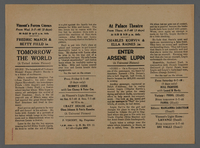
Advertising herald for the film, “Tomorrow- The World!” (1944)
Object
Herald for the film, “Tomorrow- The World!” released by United Artists in December 1944. Heralds were small, inexpensive flyers usually included as part of a film’s press kit. The film was based on a popular 1943 Broadway play of the same name, and centers around a 12-year-old member of the Hitler Youth who moves to the United States to live with his American uncle. Despite his parents’ deaths in a concentration camp, the young boy is entrenched in Nazi ideology, and is arrogant, insulting, and outwardly antagonistic towards his uncle’s Jewish fiancée. The adults debate over the best way to handle the boy, and by extension, Nazi Germany. After a more physical tactic ends in disaster, the characters find that a compassionate and loving approach breaks through. This serves as a metaphor for how to treat the ordinary German citizens living under the brutality of the Nazi regime. “Tomorrow, the World!” carries an underlying message that they were unwillingly forced into the Nazi ideology, and the film promotors even suggested that local discussions should held. This object is one of more than 1,200 objects in the Cinema Judaica Collection of materials related to films about World War II and the Holocaust as well as Jewish, Israeli, and biblical themes.
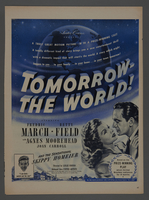
Magazine advertisement for the film, “Tomorrow- The World!” (1944)
Object
Magazine advertisement for the film, “Tomorrow- The World!” released by United Artists in December 1944. The film was based on a popular 1943 Broadway play of the same name, and centers around a 12-year-old member of the Hitler Youth who moves to the United States to live with his American uncle. Despite his parents’ deaths in a concentration camp, the young boy is entrenched in Nazi ideology, and is arrogant, insulting, and outwardly antagonistic towards his uncle’s Jewish fiancée. The adults debate over the best way to handle the boy, and by extension, Nazi Germany. After a more physical tactic ends in disaster, the characters find that a compassionate and loving approach breaks through. This serves as a metaphor for how to treat the ordinary German citizens living under the brutality of the Nazi regime. “Tomorrow, the World!” carries an underlying message that they were unwillingly forced into the Nazi ideology, and the film promotors even suggested that local discussions should held. This object is one of more than 1,200 objects in the Cinema Judaica Collection of materials related to films about World War II and the Holocaust as well as Jewish, Israeli, and biblical themes.
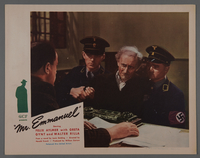
Set of six lobby cards for the British film, “Mr. Emmanuel” (1944)
Object
Set of six lobby cards for the British film, “Mr. Emmanuel,” released in the United Kingdom in October 1944, and in the United States in January 1945. Lobby cards are promotional materials placed in theater lobby windows to highlight specific movie scenes, rather than the broader themes often depicted on posters. “Mr. Emmanuel” was based on a 1939 novel of the same name, written by Louis Golding. The film centers on a Jewish man who had become a naturalized British citizen and travels to prewar Nazi Germany to search for the mother of an orphaned boy. While there, he winds up in a concentration camp. He is eventually released with the help of the daughter of an old friend, who is the mistress of an ambitious Nazi officer. Shortly after the film premiered in the United States, the Soviet army liberated the Auschwitz camp complex on January 27, 1945. Although “Mr. Emmanuel” depicts the title character in a camp, it paled in comparison to the horrific conditions and experiences of actual victims shown in the news and video footage. This object is one of more than 1,200 objects in the Cinema Judaica Collection of materials related to films about World War II and the Holocaust as well as Jewish, Israeli, and biblical themes.
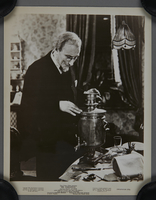
Set of three scene stills for the British film, “Mr. Emmanuel” (1944)
Object
Set of three scene stills for the British film, “Mr. Emmanuel,” released in the United Kingdom in October 1944, and in the United States in January 1945. Scene stills are photographs taken on or off the set of a motion picture and are then used as marketing and advertising tools. “Mr. Emmanuel” was based on a 1939 novel of the same name, written by Louis Golding. The film centers on a Jewish man who had become a naturalized British citizen and travels to prewar Nazi Germany to search for the mother of an orphaned boy. While there, he winds up in a concentration camp. He is eventually released with the help of the daughter of an old friend, who is the mistress of an ambitious Nazi officer. Shortly after the film premiered in the United States, the Soviet army liberated the Auschwitz camp complex on January 27, 1945. Although “Mr. Emmanuel” depicts the title character in a camp, it paled in comparison to the horrific conditions and experiences of actual victims shown in the news and video footage. This object is one of more than 1,200 objects in the Cinema Judaica Collection of materials related to films about World War II and the Holocaust as well as Jewish, Israeli, and biblical themes.
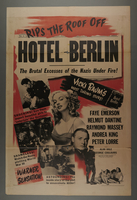
One-sheet poster for the film, “Hotel Berlin” (1945)
Object
One-sheet poster for the American film, “Hotel Berlin,” released by Warner Brothers in March 1945. “Hotel Berlin” was based on the 1943 novel of the same name by Vicki Baum, a part-Jewish immigrant from Germany. The film features characters from all walks of life, including hotel staff, Nazi officers, spies, prison escapees, and actresses. During the course of the film, their lives and motivations intersect as it becomes clear that Germany will lose the war. The characters all display some moral ambiguity, evoking a contentious level of sympathy. The end of the film displays a quoted statement, followed by the signatures of Roosevelt, Churchill, and Stalin, that they didn’t want to punish the German people as a whole, just the Nazi party and its ideology. The script was updated multiple times during filming as news came in from the front, and production on “Hotel Berlin” ended in January 1945. Warner Brothers rushed to release the film alongside the Allied push towards Berlin. The film was released just two months before the German army surrendered on May 7, 1945. This object is one of more than 1,200 objects in the Cinema Judaica Collection of materials related to films about World War II and the Holocaust as well as Jewish, Israeli, and biblical themes.
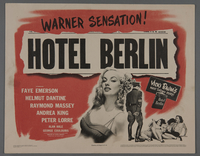
Pair of lobby cards for the film, “Hotel Berlin” (1945)
Object
Pair of lobby cards for the American film, “Hotel Berlin,” released by Warner Brothers in March 1945. Lobby cards are promotional materials placed in theater lobby windows to highlight specific movie scenes, rather than the broader themes often depicted on posters.“Hotel Berlin” was based on the 1943 novel of the same name by Vicki Baum, a part-Jewish immigrant from Germany. The film features characters from all walks of life, including hotel staff, Nazi officers, spies, prison escapees, and actresses. During the course of the film, their lives and motivations intersect as it becomes clear that Germany will lose the war. The characters all display some moral ambiguity, evoking a contentious level of sympathy. The end of the film displays a quoted statement, followed by the signatures of Roosevelt, Churchill, and Stalin, that they didn’t want to punish the German people as a whole, just the Nazi party and its ideology. The script was updated multiple times during filming as news came in from the front, and production on “Hotel Berlin” ended in January 1945. Warner Brothers rushed to release the film alongside the Allied push towards Berlin. The film was released just two months before the German army surrendered on May 7, 1945. This object is one of more than 1,200 objects in the Cinema Judaica Collection of materials related to films about World War II and the Holocaust as well as Jewish, Israeli, and biblical themes.
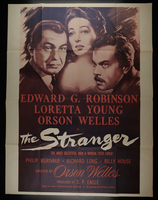
Re-release poster for the film, “The Stranger” (1946)
Object
Poster for the film, “The Stranger,” released by RKO Radio Pictures in the summer of 1946, and re-released in the United States by Independent Releasing Corporation in 1953. “The Stranger” tells the story of Mr. Wilson, an American member of the War Crimes Commission, who is searching for Franz Kindler, a dangerous and elusive Nazi. Wilson releases an old associate of Kindler, hoping he will inadvertently lead him to his quarry. He follows him through Latin America to New England, and discovers that Kindler is living under a false identity and has married the daughter of a Supreme Court Justice. Writer Victor Trivas received an Academy Award nomination for Best Original Story. Directed by and starring Orson Welles, the film was a detective thriller, rather than a Holocaust film. It was emblematic of a post-war shift from portraying victimization at the hands of the Nazis to more familiar narrative frameworks. This object is one of more than 1,200 objects in the Cinema Judaica Collection of materials related to films about World War II and the Holocaust as well as Jewish, Israeli, and biblical themes.
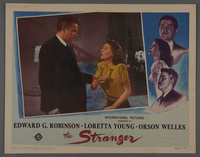
Lobby card for the film, “The Stranger” (1946)
Object
Lobby card for the film, “The Stranger,” released by RKO Radio Pictures in the summer of 1946. Lobby cards are promotional materials placed in theater lobby windows to highlight specific movie scenes, rather than the broader themes often depicted on posters. “The Stranger” tells the story of Mr. Wilson, an American member of the War Crimes Commission, who is searching for Franz Kindler, a dangerous and elusive Nazi. Wilson releases an old associate of Kindler, hoping he will inadvertently lead him to his quarry. He follows him through Latin America to New England, and discovers that Kindler is living under a false identity and has married the daughter of a Supreme Court Justice. Writer Victor Trivas received an Academy Award nomination for Best Original Story. Directed by and starring Orson Welles, the film was a detective thriller, rather than a Holocaust film. It was emblematic of a post-war shift from portraying victimization at the hands of the Nazis to more familiar narrative frameworks. This object is one of more than 1,200 objects in the Cinema Judaica Collection of materials related to films about World War II and the Holocaust as well as Jewish, Israeli, and biblical themes.
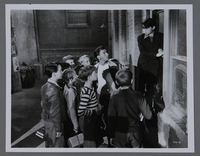
Scene still for the short film “The House I Live In” (1945)
Object
Scene still for the American short film, “The House I Live In,” starring Frank Sinatra and released by RKO Radio Pictures in November 1945, a few months after the war ended in the Pacific. Scene stills are photographs taken on or off the set of a motion picture and used as marketing and advertising tools. The film received a special award for Tolerance Short Subject at the 1945 Oscars, and a Golden Globe for Promoting International Tolerance. “The House I Live In” was also added to the National Film Registry at the Library of Congress in 2007. Running at just 11 minutes, the narrative is bookended by Sinatra singing two songs. During a recording break, Sinatra steps outside, stops a group of boys from attacking another boy, and teaches them a lesson on religious and ethnic tolerance. The film incorporates aerial combat footage as he tells the story of the partnership between an American Presbyterian bomber pilot, Colin Kelly, and a Jewish American bombardier, Meyer Levin. The pair were part of the plane crew that bombed the first Japanese warship after the attack on Pearl Harbor. At the time, it was believed the ship sunk. However, the ship remained afloat, but the event boosted American morale, which was at a low after the attack on Pearl Harbor. This object is one of more than 1,200 objects in the Cinema Judaica Collection of materials related to films about World War II and the Holocaust as well as Jewish, Israeli, and biblical themes.
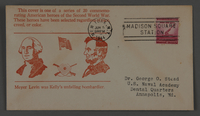
Commemorative envelope honoring World War II bombardier Meyer Levin
Object
Envelope commemorating the Jewish American bombardier, Meyer Levin, whose partnership with Presbyterian pilot Colin Kelly is related in the American short film, “The House I Live In,” starring Frank Sinatra and released by RKO Radio Pictures in November 1945, a few months after the war ended in the Pacific. The film received a special award for Tolerance Short Subject at the 1945 Oscars, and a Golden Globe for Promoting International Tolerance. “The House I Live In” was also added to the National Film Registry at the Library of Congress in 2007. Running at just 11 minutes, the narrative is bookended by Sinatra singing two songs. During a recording break, Sinatra steps outside, stops a group of boys from attacking another boy, and teaches them a lesson on religious and ethnic tolerance. The film incorporates aerial combat footage as he tells the story of the partnership between an American Presbyterian bomber pilot, Colin Kelly, and a Jewish American bombardier, Meyer Levin. The pair were part of the plane crew that bombed the first Japanese warship after the attack on Pearl Harbor. At the time, it was believed the ship sunk. However, the ship remained afloat, but the event boosted American morale, which was at a low after the attack on Pearl Harbor. This object is one of more than 1,200 objects in the Cinema Judaica Collection of materials related to films about World War II and the Holocaust as well as Jewish, Israeli, and biblical themes.
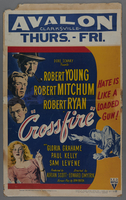
Window card for the film “Crossfire” (1947)
Object
Window card for the American feature film, “Crossfire,” released by RKO Radio Pictures in July 1947. Window cards were mass-produced promotional materials used until the mid-1980s. They included a blank section at the top for individual theaters to write in dates and show times, and placed in locations outside of the theaters. “Crossfire” was nominated for five Academy Awards, and won several others, including “Best Social Film” at the Cannes Film Festival. The film was based on the 1945 novel, The Brick Foxhole, by Richard Brooks. As part of the film noir genre, “Crossfire” depicts a murder investigation, focusing on a group of demobilized soldiers. In the novel, the victim was homosexual, however, depicting a homosexual on-screen was deemed unacceptable by the censors at the Production Code Administration. He was rewritten as a Jewish man for the film, making it a condemnation of antisemitism. Just a few months after the film’s release, the producer and director refused to answer questions about communist activities and affiliations before the House Un-American Activities Committee. They were indicted and convicted for contempt of Congress, and subsequently imprisoned and blacklisted from Hollywood. This object is one of more than 1,200 objects in the Cinema Judaica Collection of materials related to films about World War II and the Holocaust as well as Jewish, Israeli, and biblical themes.
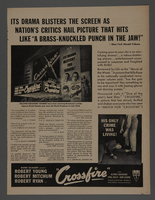
Five magazine ads for the film “Crossfire” (1947)
Object
Five magazine advertisements for the American feature film, “Crossfire,” released by RKO Radio Pictures in July 1947. “Crossfire” was nominated for five Academy Awards, and won several others, including “Best Social Film” at the Cannes Film Festival. The film was based on the 1945 novel, The Brick Foxhole, by Richard Brooks. As part of the film noir genre, “Crossfire” depicts a murder investigation, focusing on a group of demobilized soldiers. In the novel, the victim was homosexual, however, depicting a homosexual on-screen was deemed unacceptable by the censors at the Production Code Administration. He was rewritten as a Jewish man for the film, making it a condemnation of antisemitism. Just a few months after the film’s release, the producer and director refused to answer questions about communist activities and affiliations before the House Un-American Activities Committee. They were indicted and convicted for contempt of Congress, and subsequently imprisoned and blacklisted from Hollywood. This object is one of more than 1,200 objects in the Cinema Judaica Collection of materials related to films about World War II and the Holocaust as well as Jewish, Israeli, and biblical themes.
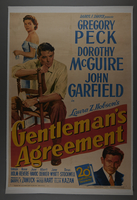
U.S. One Sheet Poster for the film “Gentleman’s Agreement” (1947)
Object
One-sheet poster for the film, “Gentleman’s Agreement,” premiered by 20th Century Fox on November 11, 1947. The film was based on a story written by Laura Z. Hobson, which was serialized from 1946-1947 and published in a stand-alone novel in 1947. “Gentleman’s Agreement” was nominated for eight Academy Awards, and beat RKO’s similarly themed film, “Crossfire” to win Best Picture, Best Supporting Actress, and Best Director. The film also won four Golden Globes and was added to the National Film Registry at the Library of Congress in 2017. “Gentleman’s Agreement” tells the story of a journalist who pretends to be Jewish so he can write an in-depth story about antisemitism. He immediately begins to see the rooted antisemitism on all sides, from colleagues at his office, to interactions with a physician, and even at a hotel. As the ruse continues, a rift grows between the journalist and his fiancée, who is reluctant to speak out against antisemitic comments in her social circle. Prior to production, some Jewish executives in Hollywood feared that the film would actually incite more antisemitism. The film proved to be daring for its time, calling out openly antisemitic politicians and other public figures. It also forced the audience to come to terms with their own underlying views and actions, both overt and subtle. This object is one of more than 1,200 objects in the Cinema Judaica Collection of materials related to films about World War II and the Holocaust as well as Jewish, Israeli, and biblical themes.
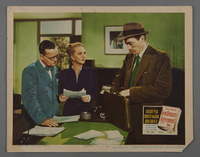
Set of eight lobby cards for the film “Gentleman’s Agreement” (1947)
Object
Set of eight lobby cards for the film, “Gentleman’s Agreement,” premiered by 20th Century Fox on November 11, 1947. Lobby cards are promotional materials placed in theater lobby windows to highlight specific movie scenes, rather than the broader themes often depicted on posters. The film was based on a story written by Laura Z. Hobson, which was serialized from 1946-1947 and published in a stand-alone novel in 1947. “Gentleman’s Agreement” was nominated for eight Academy Awards, and beat RKO’s similarly themed film, “Crossfire” to win Best Picture, Best Supporting Actress, and Best Director. The film also won four Golden Globes and was added to the National Film Registry at the Library of Congress in 2017. “Gentleman’s Agreement” tells the story of a journalist who pretends to be Jewish so he can write an in-depth story about antisemitism. He immediately begins to see the rooted antisemitism on all sides, from colleagues at his office, to interactions with a physician, and even at a hotel. As the ruse continues, a rift grows between the journalist and his fiancée, who is reluctant to speak out against antisemitic comments in her social circle. Prior to production, some Jewish executives in Hollywood feared that the film would actually incite more antisemitism. The film proved to be daring for its time, calling out openly antisemitic politicians and other public figures. It also forced the audience to come to terms with their own underlying views and actions, both overt and subtle. This object is one of more than 1,200 objects in the Cinema Judaica Collection of materials related to films about World War II and the Holocaust as well as Jewish, Israeli, and biblical themes.
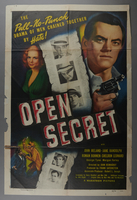
One-sheet poster for the film “Open Secret” (1948)
Object
One-sheet poster for the film, “Open Secret,” released on February 14, 1948. The film follows a newlywed couple as they work to figure out what happened to their friend, who goes missing just before they arrive for a visit. They discover that he attempted to infiltrate an antisemitic ring of thugs, and become embroiled themselves trying to bring the gang to justice. The low budget B-film, “Open Secret,” was poorly received, and panned as a subpar knockoff to films like “Crossfire” and “Gentleman’s Agreement.” Unlike the other films, however, “Open Secret” depicts post-war antisemitism from a working-class perspective. It was also the first to show a Jewish character physically fighting back against his aggressors. This object is one of more than 1,200 objects in the Cinema Judaica Collection of materials related to films about World War II and the Holocaust as well as Jewish, Israeli, and biblical themes.
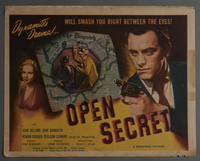
Set of eight lobby cards for the film “Open Secret” (1948)
Object
Set of eight lobby cards for the film, “Open Secret,” released on February 14, 1948. Lobby cards are promotional materials placed in theater lobby windows to highlight specific movie scenes, rather than the broader themes often depicted on posters. The film follows a newlywed couple as they work to figure out what happened to their friend, who goes missing just before they arrive for a visit. They discover that he attempted to infiltrate an antisemitic ring of thugs, and become embroiled themselves trying to bring the gang to justice. The low budget B-film, “Open Secret,” was poorly received, and panned as a subpar knockoff to films like “Crossfire” and “Gentleman’s Agreement.” Unlike the other films, however, “Open Secret” depicts post-war antisemitism from a working-class perspective. It was also the first to show a Jewish character physically fighting back against his aggressors. This object is one of more than 1,200 objects in the Cinema Judaica Collection of materials related to films about World War II and the Holocaust as well as Jewish, Israeli, and biblical themes.
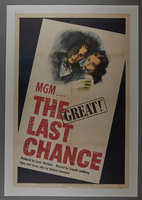
One-sheet poster for the film “The Last Chance” (1945)
Object
One-sheet poster for the film, “The Last Chance,” released in the United States in February 1945. The film was originally released in Switzerland under the German title, “Die Letzte Chance,” in May 1945, and won the Grand Prize and the International Peace Award at the Cannes Film Festival in 1946. The film is set in German-occupied Italy in 1943, and focuses on three Allied soldiers who escape a prisoner-of-war camp and join a group of 14 refugees making a perilous journey to the Swiss border. In reality, the refugees would probably not have been allowed to stay in Switzerland as the government had instituted very strict refugee laws. The lead actors playing the American and British soldiers were actual members of their respective militaries who escaped to Switzerland after being captured. Ray Reagan was in the U.S. Air Force, when his plane was shot down over enemy territory. John Hoy was a British Lieutenant who escaped from an Italian prison camp. E.G. Morrison was also a British soldier, who had been captured by the Germans in North Africa and sent to a camp in Italy, from which he escaped. In addition to the stars, the majority of the cast were also amateur actors. This object is one of more than 1,200 objects in the Cinema Judaica Collection of materials related to films about World War II and the Holocaust as well as Jewish, Israeli, and biblical themes.
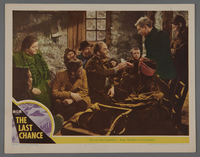
Set of five lobby cards for the film “The Last Chance” (1945)
Object
Set of five lobby cards for the film, “The Last Chance,” released in the United States in February 1945. Lobby cards are promotional materials placed in theater lobby windows to highlight specific movie scenes, rather than the broader themes often depicted on posters. The film was originally released in Switzerland under the German title, “Die Letzte Chance,” in May 1945, and won the Grand Prize and the International Peace Award at the Cannes Film Festival in 1946. The film is set in German-occupied Italy in 1943, and focuses on three Allied soldiers who escape a prisoner-of-war camp and join a group of 14 refugees making a perilous journey to the Swiss border. In reality, the refugees would probably not have been allowed to stay in Switzerland as the government had instituted very strict refugee laws. The lead actors playing the American and British soldiers were actual members of their respective militaries who escaped to Switzerland after being captured. Ray Reagan was in the U.S. Air Force, when his plane was shot down over enemy territory. John Hoy was a British Lieutenant who escaped from an Italian prison camp. E.G. Morrison was also a British soldier, who had been captured by the Germans in North Africa and sent to a camp in Italy, from which he escaped. In addition to the stars, the majority of the cast were also amateur actors. This object is one of more than 1,200 objects in the Cinema Judaica Collection of materials related to films about World War II and the Holocaust as well as Jewish, Israeli, and biblical themes.
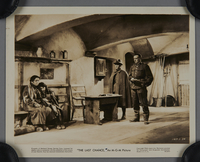
Set of three scene stills for the film “The Last Chance” (1945)
Object
Set of three scene stills for the film, “The Last Chance,” released in the United States in February 1945. Scene stills are photographs taken on or off the set of a motion picture and are then used as marketing and advertising tools. The film was originally released in Switzerland under the German title, “Die Letzte Chance,” in May 1945, and won the Grand Prize and the International Peace Award at the Cannes Film Festival in 1946. The film is set in German-occupied Italy in 1943, and focuses on three Allied soldiers who escape a prisoner-of-war camp and join a group of 14 refugees making a perilous journey to the Swiss border. In reality, the refugees would probably not have been allowed to stay in Switzerland as the government had instituted very strict refugee laws. The lead actors playing the American and British soldiers were actual members of their respective militaries who escaped to Switzerland after being captured. Ray Reagan was in the U.S. Air Force, when his plane was shot down over enemy territory. John Hoy was a British Lieutenant who escaped from an Italian prison camp. E.G. Morrison was also a British soldier, who had been captured by the Germans in North Africa and sent to a camp in Italy, from which he escaped. In addition to the stars, the majority of the cast were also amateur actors. This object is one of more than 1,200 objects in the Cinema Judaica Collection of materials related to films about World War II and the Holocaust as well as Jewish, Israeli, and biblical themes.
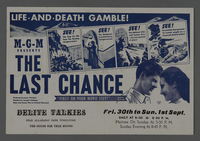
English-language international herald for the film “The Last Chance” (1945)
Object
British-Indian herald for the film, “The Last Chance,” originally released in March 1945 in Switzerland as, “Die Letzte Chance.” Heralds were small, inexpensive flyers usually included as part of a film’s press kit. The film won the Grand Prize and the International Peace Award at the Cannes Film Festival in 1946, the first after the end of the war. Great Britain ruled three-fifths of the Indian subcontinent from 1858 to 1947, and during World War II, received monetary and military support from their allies in the region. The film is set in German-occupied Italy in 1943, and focuses on three Allied soldiers who escape a prisoner-of-war camp and join a group of 14 refugees making a perilous journey to the Swiss border. In reality, the refugees would probably not have been allowed to stay in Switzerland as the government had instituted very strict refugee laws. The lead actors playing the American and British soldiers were actual members of their respective militaries who escaped to Switzerland after being captured. Ray Reagan was in the U.S. Air Force, when his plane was shot down over enemy territory. John Hoy was a British Lieutenant who escaped from an Italian prison camp. E.G. Morrison was also a British soldier, who had been captured by the Germans in North Africa and sent to a camp in Italy, from which he escaped. In addition to the stars, the majority of the cast were also amateur actors. This object is one of more than 1,200 objects in the Cinema Judaica Collection of materials related to films about World War II and the Holocaust as well as Jewish, Israeli, and biblical themes.
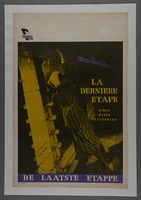
Belgian poster for the film “Ostatni Etap” (1948)
Object
Belgian poster for the film, “Ostatni Etap,” (“The Last Stop” or “The Last Stage”) originally released in Poland in March 1948, and released in Belgium as “La Derniere Etape” and “De Laatste Etappe.” The film centers on prisoners staffing the women’s camp hospital at Auschwitz and their attempted resistance activities. The film was the first theatrical Holocaust feature made in Eastern Europe following the war, and was one of the earliest epic films to center on women. It was filmed in and around the actual camp at Auschwitz, giving it a sense of accuracy and authenticity not found in other portrayals. In addition, the director, writers, and many of the cast and extras were themselves former concentration camp prisoners. Although the film centered on Nazi brutality against the Jewish population, it also depicted prisoners from other groups. “Ostatni Etap” served as a major influence on later films about the Holocaust, such as Steven Spielberg’s 1993 feature, “Schindler’s List.” This object is one of more than 1,200 objects in the Cinema Judaica Collection of materials related to films about World War II and the Holocaust as well as Jewish, Israeli, and biblical themes.
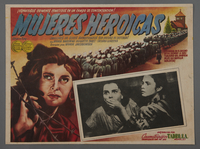
Set of seven lobby cards for the film “Ostatni Etap” (1948)
Object
Set of seven Mexican lobby cards for the film, “Ostatni Etap,” (“The Last Stop” or “The Last Stage”) originally released in Poland in March 1948, and released in Mexico as “Mujeres Heroicas” (“Heroic Women”) in 1961. Lobby cards are promotional materials placed in theater lobby windows to highlight specific movie scenes, rather than the broader themes often depicted on posters. The film centers on prisoners staffing the women’s camp hospital at Auschwitz and their attempted resistance activities. The film was the first theatrical Holocaust feature made in Eastern Europe following the war, and was one of the earliest epic films to center on women. It was filmed in and around the actual camp at Auschwitz, giving it a sense of accuracy and authenticity not found in other portrayals. In addition, the director, writers, and many of the cast and extras were themselves former concentration camp prisoners. Although the film centered on Nazi brutality against the Jewish population, it also depicted prisoners from other groups. “Ostatni Etap” served as a major influence on later films about the Holocaust, such as Steven Spielberg’s 1993 feature, “Schindler’s List.” This object is one of more than 1,200 objects in the Cinema Judaica Collection of materials related to films about World War II and the Holocaust as well as Jewish, Israeli, and biblical themes.
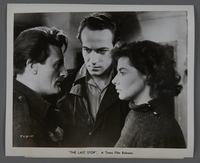
Set of 16 scene stills for the film “Ostatni Etap” (1948)
Object
Set of 16 American scene stills for the film, “Ostatni Etap,” (“The Last Stop” or “The Last Stage”) originally released in Poland in March 1948, and released in the United States in 1949. Scene stills are photographs taken on or off the set of a motion picture and used as marketing and advertising tools. The film centers on prisoners staffing the women’s camp hospital at Auschwitz and their attempted resistance activities. The film was the first theatrical Holocaust feature made in Eastern Europe following the war, and was one of the earliest epic films to center on women. It was filmed in and around the actual camp at Auschwitz, giving it a sense of accuracy and authenticity not found in other portrayals. In addition, the director, writers, and many of the cast and extras were themselves former concentration camp prisoners. Although the film centered on Nazi brutality against the Jewish population, it also depicted prisoners from other groups. “Ostatni Etap” served as a major influence on later films about the Holocaust, such as Steven Spielberg’s 1993 feature, “Schindler’s List.” This object is one of more than 1,200 objects in the Cinema Judaica Collection of materials related to films about World War II and the Holocaust as well as Jewish, Israeli, and biblical themes.
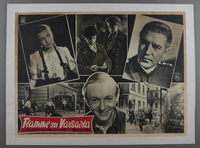
Italian poster for the film “Ulica Graniczna” (1949)
Object
Italian photobusta poster for the film, “Ulica Graniczna” (“Border Street”), originally released in Poland in 1949, and released in Italy in 1952. Photobusta posters were similar to American lobby cards, which were promotional materials placed in theater lobby windows to highlight specific movie scenes, rather than the broader themes often depicted on posters. “Ulica Graniczna” centers on several families in a tenement building in Warsaw, and features two Jewish children who are forced to relocate with their families into the Warsaw Ghetto. The film concludes with a dramatization of the Warsaw Ghetto Uprising, the first on-screen representation of the event. During production in the late 1940s, increasing communist and antisemitic sentiment in Poland led the director to relocate to Czechoslovakia, where the film was completed. The intended 1948 premiere was delayed, after a Polish state-run committee deemed the film anti-Polish and lacking characters in line with a communist ideology. It was only released after revisions were made that downplayed Poland’s role in the Holocaust. Rather than focusing on the Jewish victims, Poland’s communist authorities wanted to emphasize the struggle that the Polish people shared with their Jewish neighbors. The final version of “Ulica Graniczna” shows a variety of Polish attitudes about the Holocaust and ends ambiguously, emphasizing to the audience that racism and persecution is not over. This object is one of more than 1,200 objects in the Cinema Judaica Collection of materials related to films about World War II and the Holocaust as well as Jewish, Israeli, and biblical themes.
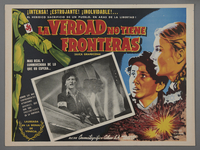
Pair of lobby cards for the film “Ulica Graniczna” (1949)
Object
Pair of Mexican lobby cards poster for the film, “Ulica Graniczna” (“Border Street”), originally released in Poland in 1949. Lobby cards are promotional materials placed in theater lobby windows to highlight specific movie scenes, rather than the broader themes often depicted on posters. “Ulica Graniczna” centers on several families in a tenement building in Warsaw, and features two Jewish children who are forced to relocate with their families into the Warsaw Ghetto. The film concludes with a dramatization of the Warsaw Ghetto Uprising, the first on-screen representation of the event. During production in the late 1940s, increasing communist and antisemitic sentiment in Poland led the director to relocate to Czechoslovakia, where the film was completed. The intended 1948 premiere was delayed, after a Polish state-run committee deemed the film anti-Polish and lacking characters in line with a communist ideology. It was only released after revisions were made that downplayed Poland’s role in the Holocaust. Rather than focusing on the Jewish victims, Poland’s communist authorities wanted to emphasize the struggle that the Polish people shared with their Jewish neighbors. The final version of “Ulica Graniczna” shows a variety of Polish attitudes about the Holocaust and ends ambiguously, emphasizing to the audience that racism and persecution is not over. This object is one of more than 1,200 objects in the Cinema Judaica Collection of materials related to films about World War II and the Holocaust as well as Jewish, Israeli, and biblical themes.
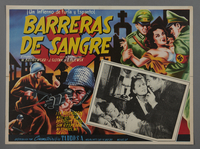
Pair of lobby cards for the film “Ulica Graniczna” (1949)
Object
Pair of Mexican lobby cards poster for the film, “Ulica Graniczna” (“Border Street”), originally released in Poland in 1949. Lobby cards are promotional materials placed in theater lobby windows to highlight specific movie scenes, rather than the broader themes often depicted on posters. “Ulica Graniczna” centers on several families in a tenement building in Warsaw, and features two Jewish children who are forced to relocate with their families into the Warsaw Ghetto. The film concludes with a dramatization of the Warsaw Ghetto Uprising, the first on-screen representation of the event. During production in the late 1940s, increasing communist and antisemitic sentiment in Poland led the director to relocate to Czechoslovakia, where the film was completed. The intended 1948 premiere was delayed, after a Polish state-run committee deemed the film anti-Polish and lacking characters in line with a communist ideology. It was only released after revisions were made that downplayed Poland’s role in the Holocaust. Rather than focusing on the Jewish victims, Poland’s communist authorities wanted to emphasize the struggle that the Polish people shared with their Jewish neighbors. The final version of “Ulica Graniczna” shows a variety of Polish attitudes about the Holocaust and ends ambiguously, emphasizing to the audience that racism and persecution is not over. This object is one of more than 1,200 objects in the Cinema Judaica Collection of materials related to films about World War II and the Holocaust as well as Jewish, Israeli, and biblical themes.
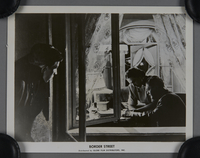
Set of 10 scene stills for the film “Ulica Graniczna” (1949)
Object
Set of 10 scene stills for the film, “Ulica Graniczna” (“Border Street”), originally released in Poland in 1949, and released in the United States in 1950. Scene stills are photographs taken on or off the set of a motion picture and are then used as marketing and advertising tools. “Ulica Graniczna” centers on several families in a tenement building in Warsaw, and features two Jewish children who are forced to relocate with their families into the Warsaw Ghetto. The film concludes with a dramatization of the Warsaw Ghetto Uprising, the first on-screen representation of the event. During production in the late 1940s, increasing communist and antisemitic sentiment in Poland led the director to relocate to Czechoslovakia, where the film was completed. The intended 1948 premiere was delayed, after a Polish state-run committee deemed the film anti-Polish and lacking characters in line with a communist ideology. It was only released after revisions were made that downplayed Poland’s role in the Holocaust. Rather than focusing on the Jewish victims, Poland’s communist authorities wanted to emphasize the struggle that the Polish people shared with their Jewish neighbors. The final version of “Ulica Graniczna” shows a variety of Polish attitudes about the Holocaust and ends ambiguously, emphasizing to the audience that racism and persecution is not over. This object is one of more than 1,200 objects in the Cinema Judaica Collection of materials related to films about World War II and the Holocaust as well as Jewish, Israeli, and biblical themes.
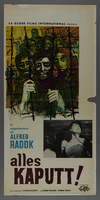
Italian poster for the film “Daleká cesta” (1949)
Object
Italian Locandina poster for the Czechoslovakian film, “Daleká cesta” (“Distant Journey”), released in Italy as “Alles Kaputt” (“All is Broken") in 1961. Locandina posters were similar to American insert posters, which were a popular size of film posters, often framed and used in special, small displays within a theater lobby. “Daleká cesta” follows a Jewish doctor in Prague who marries a Christian colleague, but is forced to quit her hospital job after the Germans invade the region. Her parents are forced to relocate to Theresienstadt ghetto-labor camp in German-occupied Czechoslovakia. Eventually, she and her husband are sent to separate camps, and she begins working as a camp doctor in Theresienstadt. The film incorporates German propaganda and documentary newsreel footage that marks the passage of time throughout the narrative. The film received approval from the Film Censorship Bureau and premiered in communist Czechoslovakia in March 1949, but the Minister of Information severely restricted publicity and distribution for it, due largely to the director’s style of aggressive expressionism. Alfred Radok, the director, was half-Jewish, and escaped from a detention camp near the end of the war, and his father and grandfather both died in Theresienstadt. This object is one of more than 1,200 objects in the Cinema Judaica Collection of materials related to films about World War II and the Holocaust as well as Jewish, Israeli, and biblical themes.
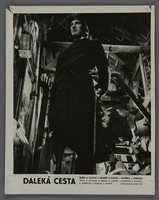
Set of seven scene stills for the film “Daleká cesta” (1949)
Object
Set of seven scene stills for the Czechoslovakian film, “Daleká cesta” (“Distant Journey”), released in Czechoslovakia in 1949. Scene stills are photographs taken on or off the set of a motion picture and are then used as marketing and advertising tools. “Daleká cesta” follows a Jewish doctor in Prague who marries a Christian colleague, but is forced to quit her hospital job after the Germans invade the region. Her parents are forced to relocate to Theresienstadt ghetto-labor camp in German-occupied Czechoslovakia. Eventually, she and her husband are sent to separate camps, and she begins working as a camp doctor in Theresienstadt. The film incorporates German propaganda and documentary newsreel footage that marks the passage of time throughout the narrative. The film received approval from the Film Censorship Bureau and premiered in communist Czechoslovakia in March 1949, but the Minister of Information severely restricted publicity and distribution for it, due largely to the director’s style of aggressive expressionism. Alfred Radok, the director, was half-Jewish, and escaped from a detention camp near the end of the war, and his father and grandfather both died in Theresienstadt. This object is one of more than 1,200 objects in the Cinema Judaica Collection of materials related to films about World War II and the Holocaust as well as Jewish, Israeli, and biblical themes.
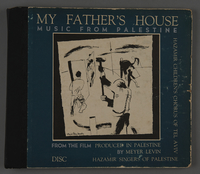
My Father's House, U.S. 78 rpm Soundtrack Record Album Cover
Object
This object is one of more than 1,200 objects in the Cinema Judaica Collection of materials related to films about World War II and the Holocaust as well as Jewish, Israeli, and biblical themes.
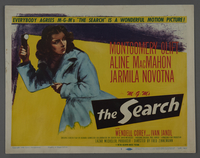
Set of seven lobby cards for the film “The Search” (1948)
Object
Set of seven lobby cards for the film, “The Search,” released in the United States in March 1948. The film won the Academy Award for Best Story, and was nominated for Best Actor, Director, and Screenplay, while actor Ivan Jandl also won a special Academy Award for outstanding juvenile performance. The film is centered on a Czechoslovakian mother and her young son, who were separated while imprisoned at Auschwitz concentration camp in German-occupied Poland. After the war, the mother searches for her son in displaced persons (DP) camps, while he is being cared for by two American soldiers. “The Search” was partially filmed in the American zone of Germany, the first American film to be made on-location in post-war Western Europe. The children in the DP camp scenes were played by real-life wards of the United Nations Relief and Rehabilitation Administration (UNRRA), making the trauma and devastation depicted on screen genuine and authentic. This object is one of more than 1,200 objects in the Cinema Judaica Collection of materials related to films about World War II and the Holocaust as well as Jewish, Israeli, and biblical themes.
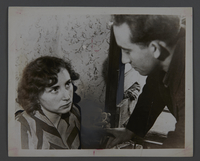
Scene still for the film “The Illegals” (1948)
Object
American scene still for the film, “The Illegals,” which was released in the United States in July 1948. The docudrama depicts the attempted illegal immigration of Jewish refugees from Poland, through Czechoslovakia, Austria, Germany, and Italy to Palestine. Before reaching its destination, the ship is captured by the British and redirected to Cyprus. “The Illegals” was filmed on-location over a six-month period, about two months before the end of the British Mandate for Palestine and the establishment of the state of Israel in May 1948. Britain had been given control of Palestine following World War I, and severely restricted the immigration of Jewish refugees, who wanted to establish a new Jewish State. This led many refugees to enter the country via “illegal” or “clandestine” immigration on ships. The director, Meyer Levin, his cameraman, Bertrand Hesse, and the two lead actors, embedded themselves in the real-life journey of refugees. After British authorities captured the ship, they arrested Levin and Hesse, and seized their footage. Although Levin was able to recover the footage, in the decades that followed, the film was dissected and lost. In the 1990s, the Spielberg Jewish Film Archive was able to reconstruct most of the full-length feature. This object is one of more than 1,200 objects in the Cinema Judaica Collection of materials related to films about World War II and the Holocaust as well as Jewish, Israeli, and biblical themes.
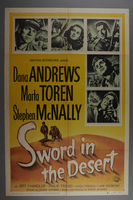
Poster for the film “Sword in the Desert” (1949)
Object
U.S. one sheet poster for the film, “Sword in the Desert,” released in the United States in August 1949. The film follows an American cargo ship captain who finds himself stranded in a Jewish settlement after smuggling a group of illegal Jewish immigrants to British-controlled Palestine. Initially self-interested and unsympathetic to the refugees, the captain has a change in heart after he is captured, imprisoned, and later escapes with them. “Sword in the Desert” was the first film made in Hollywood that depicted the Jewish struggle to establish the state of Israel in May 1948. Britain was given control of Palestine following World War I, and severely restricted the immigration of Jewish refugees who wanted to establish a new Jewish State. This led many refugees to enter the country via “illegal” or “clandestine” immigration on ships. The mass immigration of refugees also led to bitter clashes between the Arab locals and the Jewish paramilitary organization, the Haganah. The film received some criticism for portraying the British as villains, and not showing any of the conflict with the Arab population. In England, the film was perceived as anti-British and sparked outrage and several violent incidents. “Sword in the Desert” also established a new archetype of a rough-and-tumble female character that can hold her own with the Haganah fighters. This object is one of more than 1,200 objects in the Cinema Judaica Collection of materials related to films about World War II and the Holocaust as well as Jewish, Israeli, and biblical themes.

Insert poster for the film “Sword in the Desert” (1949)
Object
U.S. insert poster for the film, “Sword in the Desert,” released in the United States in August 1949. Insert posters were a popular size of film posters, often framed and used in special, small displays within a theater lobby. The film follows an American cargo ship captain who finds himself stranded in a Jewish settlement after smuggling a group of illegal Jewish immigrants to British-controlled Palestine. Initially self-interested and unsympathetic to the refugees, the captain has a change in heart after he is captured, imprisoned, and later escapes with them. “Sword in the Desert” was the first film made in Hollywood that depicted the Jewish struggle to establish the state of Israel in May 1948. Britain was given control of Palestine following World War I, and severely restricted the immigration of Jewish refugees who wanted to establish a new Jewish State. This led many refugees to enter the country via “illegal” or “clandestine” immigration on ships. The mass immigration of refugees also led to bitter clashes between the Arab locals and the Jewish paramilitary organization, the Haganah. The film received some criticism for portraying the British as villains, and not showing any of the conflict with the Arab population. In England, the film was perceived as anti-British and sparked outrage and several violent incidents. “Sword in the Desert” also established a new archetype of a rough-and-tumble female character that can hold her own with the Haganah fighters. This object is one of more than 1,200 objects in the Cinema Judaica Collection of materials related to films about World War II and the Holocaust as well as Jewish, Israeli, and biblical themes.
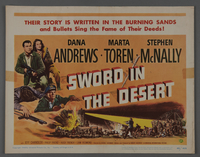
Set of eight lobby cards for the film “Sword in the Desert” (1949)
Object
Set of eight lobby cards for the film, “Sword in the Desert,” released in the United States in August 1949. Lobby cards are promotional materials placed in theater lobby windows to highlight specific movie scenes, rather than the broader themes often depicted on posters. The film follows an American cargo ship captain who finds himself stranded in a Jewish settlement after smuggling a group of illegal Jewish immigrants to British-controlled Palestine. Initially self-interested and unsympathetic to the refugees, the captain has a change in heart after he is captured, imprisoned, and later escapes with them. “Sword in the Desert” was the first film made in Hollywood that depicted the Jewish struggle to establish the state of Israel in May 1948. Britain was given control of Palestine following World War I, and severely restricted the immigration of Jewish refugees who wanted to establish a new Jewish State. This led many refugees to enter the country via “illegal” or “clandestine” immigration on ships. The mass immigration of refugees also led to bitter clashes between the Arab locals and the Jewish paramilitary organization, the Haganah. The film received some criticism for portraying the British as villains, and not showing any of the conflict with the Arab population. In England, the film was perceived as anti-British and sparked outrage and several violent incidents. “Sword in the Desert” also established a new archetype of a rough-and-tumble female character that can hold her own with the Haganah fighters. This object is one of more than 1,200 objects in the Cinema Judaica Collection of materials related to films about World War II and the Holocaust as well as Jewish, Israeli, and biblical themes.
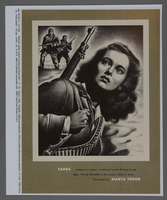
Pair of modern color proofs of advertisements for the film “Sword in the Desert” (1949)
Object
Pair of modern printing color proofs for the film, “Sword in the Desert,” released in the United States in August 1949. Color proofs display exactly how the colors will look before the final print job is produced. The film follows an American cargo ship captain who finds himself stranded in a Jewish settlement after smuggling a group of illegal Jewish immigrants to British-controlled Palestine. Initially self-interested and unsympathetic to the refugees, the captain has a change in heart after he is captured, imprisoned, and later escapes with them. “Sword in the Desert” was the first film made in Hollywood that depicted the Jewish struggle to establish the state of Israel in May 1948. Britain was given control of Palestine following World War I, and severely restricted the immigration of Jewish refugees who wanted to establish a new Jewish State. This led many refugees to enter the country via “illegal” or “clandestine” immigration on ships. The mass immigration of refugees also led to bitter clashes between the Arab locals and the Jewish paramilitary organization, the Haganah. The film received some criticism for portraying the British as villains, and not showing any of the conflict with the Arab population. In England, the film was perceived as anti-British and sparked outrage and several violent incidents. “Sword in the Desert” also established a new archetype of a rough-and-tumble female character that can hold her own with the Haganah fighters. This object is one of more than 1,200 objects in the Cinema Judaica Collection of materials related to films about World War II and the Holocaust as well as Jewish, Israeli, and biblical themes.
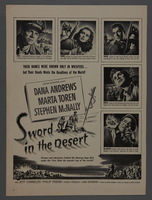
Set of four magazine advertisements for the film “Sword in the Desert” (1949)
Object
Set of four, identical full-page magazine advertisements for the film, “Sword in the Desert,” released in the United States in August 1949. The film follows an American cargo ship captain who finds himself stranded in a Jewish settlement after smuggling a group of illegal Jewish immigrants to British-controlled Palestine. Initially self-interested and unsympathetic to the refugees, the captain has a change in heart after he is captured, imprisoned, and later escapes with them. “Sword in the Desert” was the first film made in Hollywood that depicted the Jewish struggle to establish the state of Israel in May 1948. Britain was given control of Palestine following World War I, and severely restricted the immigration of Jewish refugees who wanted to establish a new Jewish State. This led many refugees to enter the country via “illegal” or “clandestine” immigration on ships. The mass immigration of refugees also led to bitter clashes between the Arab locals and the Jewish paramilitary organization, the Haganah. The film received some criticism for portraying the British as villains, and not showing any of the conflict with the Arab population. In England, the film was perceived as anti-British and sparked outrage and several violent incidents. “Sword in the Desert” also established a new archetype of a rough-and-tumble female character that can hold her own with the Haganah fighters. This object is one of more than 1,200 objects in the Cinema Judaica Collection of materials related to films about World War II and the Holocaust as well as Jewish, Israeli, and biblical themes.
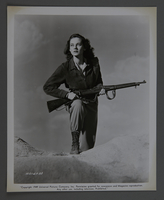
Set of twelve scene stills for the film “Sword in the Desert” (1949)
Object
Set of twelve scene stills for the film, “Sword in the Desert,” released in the United States in August 1949. Scene stills are photographs taken on or off the set of a motion picture and are then used as marketing and advertising tools. The film follows an American cargo ship captain who finds himself stranded in a Jewish settlement after smuggling a group of illegal Jewish immigrants to British-controlled Palestine. Initially self-interested and unsympathetic to the refugees, the captain has a change in heart after he is captured, imprisoned, and later escapes with them. “Sword in the Desert” was the first film made in Hollywood that depicted the Jewish struggle to establish the state of Israel in May 1948. Britain was given control of Palestine following World War I, and severely restricted the immigration of Jewish refugees who wanted to establish a new Jewish State. This led many refugees to enter the country via “illegal” or “clandestine” immigration on ships. The mass immigration of refugees also led to bitter clashes between the Arab locals and the Jewish paramilitary organization, the Haganah. The film received some criticism for portraying the British as villains, and not showing any of the conflict with the Arab population. In England, the film was perceived as anti-British and sparked outrage and several violent incidents. “Sword in the Desert” also established a new archetype of a rough-and-tumble female character that can hold her own with the Haganah fighters. This object is one of more than 1,200 objects in the Cinema Judaica Collection of materials related to films about World War II and the Holocaust as well as Jewish, Israeli, and biblical themes.
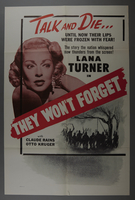
They Won't Forget, U.S. Re-release One Sheet
Object
One-sheet, re-release poster for the American feature film, “They Won’t Forget,” originally released in the United States in 1937, and re-released in 1957. Lena Turner only appeared briefly on screen, but when the film was re-released 20 years later, she had become a big enough star that she was given top billing and featured on the marketing materials. “They Won’t Forget” was adapted from the 1936 novel, “Death in the Deep South,” which author Ward Greene based on the 1913 trial of Leo Frank. Frank was a Jewish man wrongly convicted of murdering a 13-year-old girl who worked at the factory he managed. Frank was sentenced to death, but after being commuted to a life sentence by Georgia’s governor in 1915, he was lynched by an angry mob. Rather than directly referencing the only Jewish lynching victim in American history, the creators of “They Won’t Forget” changed the defendant to a professor from the North who works in a small Southern town that is resentful of Northerners and proud of its Confederate history. While both Frank and his fictional counterparts were framed as a result of discrimination, it remains unknown who actually committed the murders. The re-release of the film was set against worsening racial tensions and the Civil Rights movement. In the South, the conflict over integration spawned increased violence towards Jews. This object is one of more than 1,200 objects in the Cinema Judaica Collection of materials related to films about World War II and the Holocaust as well as Jewish, Israeli, and biblical themes.
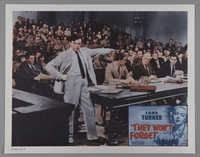
Set of four re-release lobby cards for the film “They Won’t Forget” (1937)
Object
Set of four re-release lobby cards for the American feature film, “They Won’t Forget,” released in the United States in 1937, and re-released in 1957. Lena Turner only appeared briefly on screen, but when the film was re-released 20 years later, she had become a big enough star that she was given top billing and featured on the marketing materials. “They Won’t Forget” was adapted from the 1936 novel, “Death in the Deep South,” which author Ward Greene based on the 1913 trial of Leo Frank. Frank was a Jewish man wrongly convicted of murdering a 13-year-old girl who worked at the factory he managed. Frank was sentenced to death, but after being commuted to a life sentence by Georgia’s governor in 1915, he was lynched by an angry mob. Rather than directly referencing the only Jewish lynching victim in American history, the creators of “They Won’t Forget” changed the defendant to a professor from the North who works in a small Southern town that is resentful of Northerners and proud of its Confederate history. While both Frank and his fictional counterparts were framed as a result of discrimination, it remains unknown who actually committed the murders. The re-release of the film was set against worsening racial tensions and the Civil Rights movement. In the South, the conflict over integration spawned increased violence towards Jews. This object is one of more than 1,200 objects in the Cinema Judaica Collection of materials related to films about World War II and the Holocaust as well as Jewish, Israeli, and biblical themes.
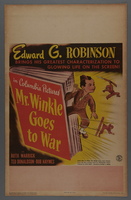
Window card for the film “Mr. Winkle Goes to War” (1944)
Object
Window card for the American feature film, “Mr. Winkle Goes to War,” released by Columbia Pictures in July 1944. Window cards were mass-produced promotional materials used until the mid-1980s. They included a blank section at the top for individual theaters to write in dates and show times, and were placed in locations outside of the theaters. “Mr. Winkle” is centered on a humble, former bank clerk who is drafted into the Army and shipped overseas. The film was adapted from Theodore Pratt’s novel, which was serialized in the New York Post. The film’s star, Edward G. Robinson, was a child when his Jewish family fled Romania due to antisemitic persecution. The family immigrated to the United States in 1904. In the years leading up to World War II, Robinson became increasingly liberal and joined anti-fascist groups, which put him under scrutiny by the U.S. government. In the 1950s, he was investigated by the House Un-American Activities Committee for possible communist affiliations. Robinson had to testify before the committee three times before his name was finally cleared. This object is one of more than 1,200 objects in the Cinema Judaica Collection of materials related to films about World War II and the Holocaust as well as Jewish, Israeli, and biblical themes.
Lobby card for the film “Confessions of a Nazi Spy” (1939)
Object
Lobby card, distributed by Vitagraph (a Warner Bros. subsidiary), for the American feature film “Confessions of a Nazi Spy” released by Warner Bros. Pictures in May 1939. Lobby cards are promotional materials placed in theater lobby windows to highlight specific movie scenes, rather than the broader themes often depicted on posters. The film was chosen as Best Picture of the Year by the National Board of Review in 1939. Based on articles written in the New York Post by ex-agent Leon G. Turrou, the film recounts a fictionalized version of the Federal Bureau of Investigation’s (FBI) Rumrich Nazi Spy Case (1938). The film follows FBI agent Edward Renard’s investigation of Nazi spies affiliated with the German-American Bund as they work to steal American military secrets in the late 1930s. This was the first openly anti-Nazi film released by a prominent American movie studio. It took a firm stance on political matters, and deliberately warned the public about the dangers posed by a foreign power. The German Consul General in Los Angeles tried to halt production of the film, but failed. Fearing possible retribution for their relatives in Germany or German-controlled areas, many actors turned down roles in the film. While it was being shot, the studio received more than 100 threats, and had to hire security for the set. Upon release in the US, some citizens wanted it banned, while others picketed theaters and threatened exhibitors. In Poland, antisemitic audiences hanged exhibitors in their own theaters for showing the film. In 1939, it was banned in Germany, Italy, Japan, Holland, Norway, and Sweden. In 1940, “Confessions” was re-released with added newsreel footage of Nazi occupations in Europe, and was banned in an additional 18 nations where the Nazi regime could exert influence. This object is one of more than 1,200 objects in the Cinema Judaica Collection of materials related to films about World War II and the Holocaust as well as Jewish, Israeli, and biblical themes.
Double-size British trade advertisement for the film “Confessions of a Nazi Spy” (1939)
Object
British trade advertisement for the American feature film “Confessions of a Nazi Spy” released by Warner Bros. Pictures in May 1939. Movie manufacturers send trade advertisements to exhibitors to increase the distribution of a film to as many theaters as possible. The film was chosen as Best Picture of the Year by the National Board of Review in 1939. Based on articles written in the New York Post by ex-agent Leon G. Turrou, the film recounts a fictionalized version of the Federal Bureau of Investigation’s (FBI) Rumrich Nazi Spy Case (1938). The film follows FBI agent Edward Renard’s investigation of Nazi spies affiliated with the German-American Bund as they work to steal American military secrets in the late 1930s. This was the first openly anti-Nazi film released by a prominent American movie studio. It took a firm stance on political matters, and deliberately warned the public about the dangers posed by a foreign power. The German Consul General in Los Angeles tried to halt production of the film, but failed. Fearing possible retribution for their relatives in Germany or German-controlled areas, many actors turned down roles in the film. While it was being shot, the studio received more than 100 threats, and had to hire security for the set. Upon release in the US, some citizens wanted it banned, while others picketed theaters and threatened exhibitors. In Poland, antisemitic audiences hanged exhibitors in their own theaters for showing the film. In 1939, it was banned in Germany, Italy, Japan, Holland, Norway, and Sweden. In 1940, “Confessions” was re-released with added newsreel footage of Nazi occupations in Europe, and was banned in an additional 18 nations where the Nazi regime could exert influence. This object is one of more than 1,200 objects in the Cinema Judaica Collection of materials related to films about World War II and the Holocaust as well as Jewish, Israeli, and biblical themes.
Set of Canadian newsprint advertisements for the film “Confessions of a Nazi Spy” (1939)
Object
Canadian newspaper advertisements for the American feature film “Confessions of a Nazi Spy” released by Warner Bros. Pictures in May 1939. The film was chosen as Best Picture of the Year by the National Board of Review in 1939. Based on articles written in the New York Post by ex-agent Leon G. Turrou, the film recounts a fictionalized version of the Federal Bureau of Investigation’s (FBI) Rumrich Nazi Spy Case (1938). The film follows FBI agent Edward Renard’s investigation of Nazi spies affiliated with the German-American Bund as they work to steal American military secrets in the late 1930s. This was the first openly anti-Nazi film released by a prominent American movie studio. It took a firm stance on political matters, and deliberately warned the public about the dangers posed by a foreign power. The German Consul General in Los Angeles tried to halt production of the film, but failed. Fearing possible retribution for their relatives in Germany or German-controlled areas, many actors turned down roles in the film. While it was being shot, the studio received more than 100 threats, and had to hire security for the set. Upon release in the US, some citizens wanted it banned, while others picketed theaters and threatened exhibitors. In Poland, antisemitic audiences hanged exhibitors in their own theaters for showing the film. In 1939, it was banned in Germany, Italy, Japan, Holland, Norway, and Sweden. In 1940, “Confessions” was re-released with added newsreel footage of Nazi occupations in Europe, and was banned in an additional 18 nations where the Nazi regime could exert influence. This object is one of more than 1,200 objects in the Cinema Judaica Collection of materials related to films about World War II and the Holocaust as well as Jewish, Israeli, and biblical themes.
Set of four scene stills from the movie “Sons of Liberty” (1939)
Object
Set of four scene stills from the American short film “Sons of Liberty” released by Warner Bros. Pictures in May 1939. The film won the Academy Award for Best Short Subject (Two-Reel) in 1940. Scene stills are photographs taken on or off the set of a motion picture and are then used as marketing and advertising tools. “Sons of Liberty” tells the story of Haym Salomon’s role as a financier of the American Revolution and a spy for the secret American paramilitary political organization, the Sons of Liberty. Salomon was a Polish born Jew who immigrated to America in the 1770s. His actions in support of the American Revolution helped to establish a legacy of Jewish-American heritage that dates back to the founding of the United States. This object is one of more than 1,200 objects in the Cinema Judaica Collection of materials related to films about World War II and the Holocaust as well as Jewish, Israeli, and biblical themes.
Set of three lobby cards for the film “Espionage Agent" (1939)
Object
Lobby cards for the American feature film “Espionage Agent” released by Warner Bros. Pictures in September 1939. Lobby cards are promotional materials placed in theater lobby windows to highlight specific movie scenes, rather than the broader themes often depicted on posters. In “Espionage Agent,” Barry Corvall is a rookie diplomat who discovers that his new bride has been serving as an undercover agent for the Germans. He resigns from the diplomatic service, and the couple travels to Europe to expose a German spy ring. This was the first American film to utilize the premise of compromised or divided family loyalties. “Espionage Agent” makes an argument for a foreign intelligence service, more than three years before the establishment of the Office of Strategic Services (the forerunner to the Central Intelligence Agency). It was also the first to portray Germany as intent on destroying the American military, and was released weeks after the German invasion of Poland. This object is one of more than 1,200 objects in the Cinema Judaica Collection of materials related to films about World War II and the Holocaust as well as Jewish, Israeli, and biblical themes.
U.S. Pressbook for the film “Hitler, Beast of Berlin" (1939)
Object
Pressbook for the American feature film “Hitler, Beast of Berlin” released by Producers Pictures Corporation in October 1939, and re-released in 1942. After encountering opposition from censorship boards, the film was alternatively called “Goose Step,” the title of the adapted novel, and eventually released as “Beasts of Berlin.” In the film, Hans Memling, his wife, and his brother-in-law are members of an underground Nazi-resistance movement. He is arrested and ends up in a camp as a political prisoner. Hans and the other prisoners are interrogated, beaten, and forced into slave labor at the hands of Nazi guards. This was the first American film to depict a simulated concentration camp in Germany. The film also includes newsreel footage of military marches and of Adolf Hitler himself. While it acknowledged a pervasive isolationist mentality, “Beasts” also appealed to the American values of democracy and freedom. Press materials encouraged a sensationalist marketing strategy while official statements claimed that the film was not propaganda. Prior to its release, “Beasts of Berlin” received numerous sanctions from the censors at the Production Code Administration (PCA). This object is one of more than 1,200 objects in the Cinema Judaica Collection of materials related to films about World War II and the Holocaust as well as Jewish, Israeli, and biblical themes.
The Lion Has Wings, British Trade Ad
Object
This object is one of more than 1,200 objects in the Cinema Judaica Collection of materials related to films about World War II and the Holocaust as well as Jewish, Israeli, and biblical themes.
The Lion Has Wings, British FOH Scene Stills (set of 7)
Object
This object is one of more than 1,200 objects in the Cinema Judaica Collection of materials related to films about World War II and the Holocaust as well as Jewish, Israeli, and biblical themes.
The Mortal Storm,U.S. Magazine Ad
Object
This object is one of more than 1,200 objects in the Cinema Judaica Collection of materials related to films about World War II and the Holocaust as well as Jewish, Israeli, and biblical themes.
The Mortal Storm, U.S. Publicity Postcard
Object
This object is one of more than 1,200 objects in the Cinema Judaica Collection of materials related to films about World War II and the Holocaust as well as Jewish, Israeli, and biblical themes.
Life (New York, New York) [Magazine]
Object
This object is one of more than 1,200 objects in the Cinema Judaica Collection of materials related to films about World War II and the Holocaust as well as Jewish, Israeli, and biblical themes.
Liberty (New York, New York) [Magazine]
Object
This object is one of more than 1,200 objects in the Cinema Judaica Collection of materials related to films about World War II and the Holocaust as well as Jewish, Israeli, and biblical themes.
Liberty (New York, New York) [Magazine]
Object
This object is one of more than 1,200 objects in the Cinema Judaica Collection of materials related to films about World War II and the Holocaust as well as Jewish, Israeli, and biblical themes.
Liberty (New York, New York) [Magazine]
Object
This object is one of more than 1,200 objects in the Cinema Judaica Collection of materials related to films about World War II and the Holocaust as well as Jewish, Israeli, and biblical themes.
Liberty (New York, New York) [Magazine]
Object
This object is one of more than 1,200 objects in the Cinema Judaica Collection of materials related to films about World War II and the Holocaust as well as Jewish, Israeli, and biblical themes.
Liberty (New York, New York) [Magazine]
Object
This object is one of more than 1,200 objects in the Cinema Judaica Collection of materials related to films about World War II and the Holocaust as well as Jewish, Israeli, and biblical themes.
Liberty (New York, New York) [Magazine]
Object
This object is one of more than 1,200 objects in the Cinema Judaica Collection of materials related to films about World War II and the Holocaust as well as Jewish, Israeli, and biblical themes.
Foreign Correspondent, U.S. Re-release Pressbook
Object
This object is one of more than 1,200 objects in the Cinema Judaica Collection of materials related to films about World War II and the Holocaust as well as Jewish, Israeli, and biblical themes.
Pastor Hall, U.S. Pressbook
Object
This object is one of more than 1,200 objects in the Cinema Judaica Collection of materials related to films about World War II and the Holocaust as well as Jewish, Israeli, and biblical themes.
Pastor Hall, U.S. Herald
Object
This object is one of more than 1,200 objects in the Cinema Judaica Collection of materials related to films about World War II and the Holocaust as well as Jewish, Israeli, and biblical themes.
Pastor Hall, James Roosevelt Typed Letter to Winchell
Object
This object is one of more than 1,200 objects in the Cinema Judaica Collection of materials related to films about World War II and the Holocaust as well as Jewish, Israeli, and biblical themes.
Pastor Hall, James Roosevelt Typed Letter to Exhibitors
Object
This object is one of more than 1,200 objects in the Cinema Judaica Collection of materials related to films about World War II and the Holocaust as well as Jewish, Israeli, and biblical themes.
Life (New York, New York) [Magazine]
Object
This object is one of more than 1,200 objects in the Cinema Judaica Collection of materials related to films about World War II and the Holocaust as well as Jewish, Israeli, and biblical themes.
The Great Dictator, U.S. Pressbook
Object
This object is one of more than 1,200 objects in the Cinema Judaica Collection of materials related to films about World War II and the Holocaust as well as Jewish, Israeli, and biblical themes.
Theatre Arts (New York, New York) [Magazine]
Object
This object is one of more than 1,200 objects in the Cinema Judaica Collection of materials related to films about World War II and the Holocaust as well as Jewish, Israeli, and biblical themes.
Theatre Arts (New York, New York) [Magazine]
Object
This object is one of more than 1,200 objects in the Cinema Judaica Collection of materials related to films about World War II and the Holocaust as well as Jewish, Israeli, and biblical themes.
Theatre Arts (New York, New York) [Magazine]
Object
This object is one of more than 1,200 objects in the Cinema Judaica Collection of materials related to films about World War II and the Holocaust as well as Jewish, Israeli, and biblical themes.
The World in Flames, U.S. Pressbook
Object
This object is one of more than 1,200 objects in the Cinema Judaica Collection of materials related to films about World War II and the Holocaust as well as Jewish, Israeli, and biblical themes.
The World in Flames, British Pressbook
Object
This object is one of more than 1,200 objects in the Cinema Judaica Collection of materials related to films about World War II and the Holocaust as well as Jewish, Israeli, and biblical themes.
The Battle of London, U.S. Pressbook
Object
This object is one of more than 1,200 objects in the Cinema Judaica Collection of materials related to films about World War II and the Holocaust as well as Jewish, Israeli, and biblical themes.
Manhunt, U.S. Pressbook
Object
This object is one of more than 1,200 objects in the Cinema Judaica Collection of materials related to films about World War II and the Holocaust as well as Jewish, Israeli, and biblical themes.
Sergeant York,RR
Object
This object is one of more than 1,200 objects in the Cinema Judaica Collection of materials related to films about World War II and the Holocaust as well as Jewish, Israeli, and biblical themes.
Serve by Saving, Banking Brochure
Object
This object is one of more than 1,200 objects in the Cinema Judaica Collection of materials related to films about World War II and the Holocaust as well as Jewish, Israeli, and biblical themes.
Life (New York, New York) [Magazine]
Object
This object is one of more than 1,200 objects in the Cinema Judaica Collection of materials related to films about World War II and the Holocaust as well as Jewish, Israeli, and biblical themes.
It's Fun to Be Free, Coverless Program
Object
This object is one of more than 1,200 objects in the Cinema Judaica Collection of materials related to films about World War II and the Holocaust as well as Jewish, Israeli, and biblical themes.
Paris Calling, U.S. Pressbook
Object
This object is one of more than 1,200 objects in the Cinema Judaica Collection of materials related to films about World War II and the Holocaust as well as Jewish, Israeli, and biblical themes.
The Scorched Earth, U.S Pressbook
Object
This object is one of more than 1,200 objects in the Cinema Judaica Collection of materials related to films about World War II and the Holocaust as well as Jewish, Israeli, and biblical themes.
Moscow Strikes Back, U.S. Pressbook
Object
This object is one of more than 1,200 objects in the Cinema Judaica Collection of materials related to films about World War II and the Holocaust as well as Jewish, Israeli, and biblical themes.
Mission to Moscow, U.S. Pressbook
Object
This object is one of more than 1,200 objects in the Cinema Judaica Collection of materials related to films about World War II and the Holocaust as well as Jewish, Israeli, and biblical themes.
Once Upon a Honeymoon, U.S. Pressbook
Object
This object is one of more than 1,200 objects in the Cinema Judaica Collection of materials related to films about World War II and the Holocaust as well as Jewish, Israeli, and biblical themes.
Fortune (New York, New York) [Magazine]
Object
This object is one of more than 1,200 objects in the Cinema Judaica Collection of materials related to films about World War II and the Holocaust as well as Jewish, Israeli, and biblical themes.
Walt Disney's Education for Death, Fortune Magazine August 1942 article reprint, "Walt Disney: Great Teacher"
Object
This object is one of more than 1,200 objects in the Cinema Judaica Collection of materials related to films about World War II and the Holocaust as well as Jewish, Israeli, and biblical themes.
Walt Disney's Education for Death, Fortune Magazine August 1942 article reprint, "The United States in a New World II: Pacific Relations"
Object
This object is one of more than 1,200 objects in the Cinema Judaica Collection of materials related to films about World War II and the Holocaust as well as Jewish, Israeli, and biblical themes.
Life (New York, New York) [Magazine]
Object
This object is one of more than 1,200 objects in the Cinema Judaica Collection of materials related to films about World War II and the Holocaust as well as Jewish, Israeli, and biblical themes.
Hangmen Also Die U.S. Re-release Pressbook
Object
This object is one of more than 1,200 objects in the Cinema Judaica Collection of materials related to films about World War II and the Holocaust as well as Jewish, Israeli, and biblical themes.
Women in Bondage, U.S. Pressbook
Object
This object is one of more than 1,200 objects in the Cinema Judaica Collection of materials related to films about World War II and the Holocaust as well as Jewish, Israeli, and biblical themes.
The Hitler Gang, U.S. Lobby Cards (set of 2)
Object
This object is one of more than 1,200 objects in the Cinema Judaica Collection of materials related to films about World War II and the Holocaust as well as Jewish, Israeli, and biblical themes.
The Seventh Cross, U.S. Lobby Cards (set of 2)
Object
This object is one of more than 1,200 objects in the Cinema Judaica Collection of materials related to films about World War II and the Holocaust as well as Jewish, Israeli, and biblical themes.
Hit Parader (Derby, Connecticut) [Magazine]
Object
This object is one of more than 1,200 objects in the Cinema Judaica Collection of materials related to films about World War II and the Holocaust as well as Jewish, Israeli, and biblical themes.
The House I Live In, U.S. Sheet Music
Object
This object is one of more than 1,200 objects in the Cinema Judaica Collection of materials related to films about World War II and the Holocaust as well as Jewish, Israeli, and biblical themes.
Modern Screen (New York, New York) [Magazine]
Object
This object is one of more than 1,200 objects in the Cinema Judaica Collection of materials related to films about World War II and the Holocaust as well as Jewish, Israeli, and biblical themes.
Picture News [Magazine]
Object
This object is one of more than 1,200 objects in the Cinema Judaica Collection of materials related to films about World War II and the Holocaust as well as Jewish, Israeli, and biblical themes.
Crossfire, U.S. Pressbook
Object
This object is one of more than 1,200 objects in the Cinema Judaica Collection of materials related to films about World War II and the Holocaust as well as Jewish, Israeli, and biblical themes.
Gentleman's Agreement, U.S. Pressbook
Object
This object is one of more than 1,200 objects in the Cinema Judaica Collection of materials related to films about World War II and the Holocaust as well as Jewish, Israeli, and biblical themes.
Liberty (New York, New York) [Magazine]
Object
This object is one of more than 1,200 objects in the Cinema Judaica Collection of materials related to films about World War II and the Holocaust as well as Jewish, Israeli, and biblical themes.
Open Secret, U.S. Pressbook
Object
This object is one of more than 1,200 objects in the Cinema Judaica Collection of materials related to films about World War II and the Holocaust as well as Jewish, Israeli, and biblical themes.
The Last Chance, U.S. Pressbook
Object
This object is one of more than 1,200 objects in the Cinema Judaica Collection of materials related to films about World War II and the Holocaust as well as Jewish, Israeli, and biblical themes.
The Last Stop, U.S. Pressbook
Object
This object is one of more than 1,200 objects in the Cinema Judaica Collection of materials related to films about World War II and the Holocaust as well as Jewish, Israeli, and biblical themes.
The Last Stop, Polish Scene Still
Object
This object is one of more than 1,200 objects in the Cinema Judaica Collection of materials related to films about World War II and the Holocaust as well as Jewish, Israeli, and biblical themes.
The Last Stop, West German Program
Object
This object is one of more than 1,200 objects in the Cinema Judaica Collection of materials related to films about World War II and the Holocaust as well as Jewish, Israeli, and biblical themes.
The Last Stop, Danish Program
Object
This object is one of more than 1,200 objects in the Cinema Judaica Collection of materials related to films about World War II and the Holocaust as well as Jewish, Israeli, and biblical themes.
Border Street, Danish Program
Object
This object is one of more than 1,200 objects in the Cinema Judaica Collection of materials related to films about World War II and the Holocaust as well as Jewish, Israeli, and biblical themes.
Theatre Arts Magazine (New York, New York) [Magazine]
Object
This object is one of more than 1,200 objects in the Cinema Judaica Collection of materials related to films about World War II and the Holocaust as well as Jewish, Israeli, and biblical themes.
My Father's House, If I Forget Thee, Hardcover Book by Meyer Levin
Object
This object is one of more than 1,200 objects in the Cinema Judaica Collection of materials related to films about World War II and the Holocaust as well as Jewish, Israeli, and biblical themes.
The Search, U.S. Pressbook
Object
This object is one of more than 1,200 objects in the Cinema Judaica Collection of materials related to films about World War II and the Holocaust as well as Jewish, Israeli, and biblical themes.
The Search, U.S. Pressbook with Additional Exhibitor Ads
Object
This object is one of more than 1,200 objects in the Cinema Judaica Collection of materials related to films about World War II and the Holocaust as well as Jewish, Israeli, and biblical themes.
Sword in the Desert, U.S. Pressbook
Object
This object is one of more than 1,200 objects in the Cinema Judaica Collection of materials related to films about World War II and the Holocaust as well as Jewish, Israeli, and biblical themes.
The True Glory, U.S. Pressbook with Insert
Object
This object is one of more than 1,200 objects in the Cinema Judaica Collection of materials related to films about World War II and the Holocaust as well as Jewish, Israeli, and biblical themes.
Poster for the film "The Search" with autograph by Jarmila Novotná
Object
Poster: for the film "The Search" with autograph by Jarmila Novotná. This object is one of more than 1,200 objects in the Cinema Judaica Collection of materials related to films about World War II and the Holocaust as well as Jewish, Israeli, and biblical themes.
Pressbook
Object
Pressbook for "Confessions of a Nazi Spy"; Two newsprint ads for "Confessions of a Nazi Spy"; Lobby card for "Women in War." This object is one of more than 1,200 objects in the Cinema Judaica Collection of materials related to films about World War II and the Holocaust as well as Jewish, Israeli, and biblical themes.
Women in War, U.S. Lobby card
Object
This object is one of more than 1,200 objects in the Cinema Judaica Collection of materials related to films about World War II and the Holocaust as well as Jewish, Israeli, and biblical themes.
Two newsprint ads for "Confessions of a Nazi Spy"
Object
Two newsprint ads for "Confessions of a Nazi Spy." This object is one of more than 1,200 objects in the Cinema Judaica Collection of materials related to films about World War II and the Holocaust as well as Jewish, Israeli, and biblical themes.
Poster: Au revoir les enfants
Object
Accretion to Cinema Judaica, Epic Cycles material: Poster: Au revoir les enfants, 1987
Poster: We Were So Beloved
Object
Accretion to Cinema Judaica, Epic Cycles material: Poster: We Were So Beloved; The German Jews of Washington Heights, 1985
Program: Noah's Ark
Object
Accretion to Cinema Judaica, Epic Cycles material: Program: Noah's Ark starring Delores Costello and George O'Brien, 1928



